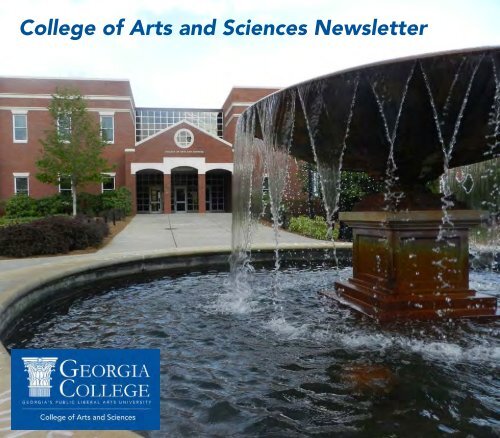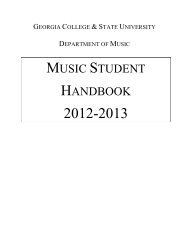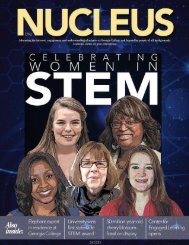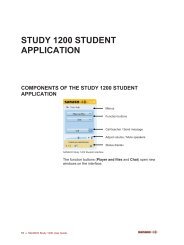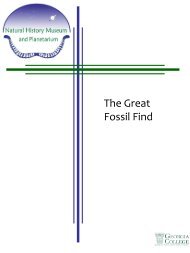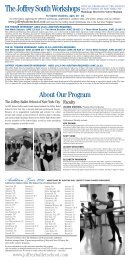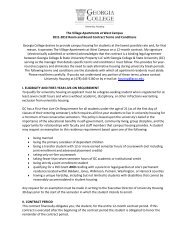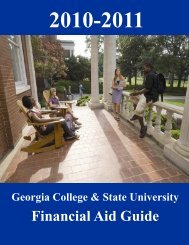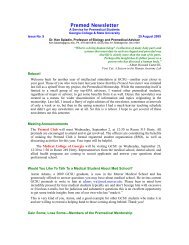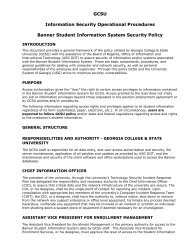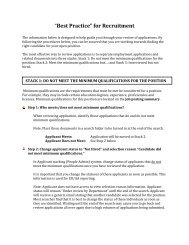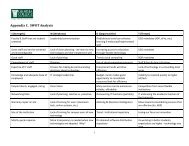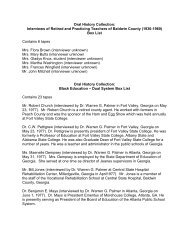College of Arts and Sciences Newsletter - Georgia College & State ...
College of Arts and Sciences Newsletter - Georgia College & State ...
College of Arts and Sciences Newsletter - Georgia College & State ...
You also want an ePaper? Increase the reach of your titles
YUMPU automatically turns print PDFs into web optimized ePapers that Google loves.
<strong>College</strong> <strong>of</strong> <strong>Arts</strong> <strong>and</strong> <strong>Sciences</strong> <strong>Newsletter</strong>
Table <strong>of</strong> Contents<br />
From the Dean’s Office...<br />
From the Dean’s Office.............................................................................................................................................3<br />
Department <strong>of</strong> Art.....................................................................................................................................................4<br />
Department <strong>of</strong> Biological <strong>and</strong> Environmental <strong>Sciences</strong>...........................................................................................5<br />
Department <strong>of</strong> Chemistry, Physics <strong>and</strong> Astronomy..................................................................................................6<br />
Department <strong>of</strong> English <strong>and</strong> Rhetoric.........................................................................................................................7<br />
Department <strong>of</strong> Government <strong>and</strong> Sociology...............................................................................................................8<br />
Department <strong>of</strong> History, Geography <strong>and</strong> Philosphy...................................................................................................9<br />
Interdisciplinary Studies.........................................................................................................................................10<br />
Department <strong>of</strong> Mass Communication......................................................................................................................11<br />
Department <strong>of</strong> Mathematics....................................................................................................................................12<br />
Department <strong>of</strong> Modern Languages <strong>and</strong> Culture......................................................................................................13<br />
Department <strong>of</strong> Music...............................................................................................................................................14<br />
Department <strong>of</strong> Psychological Science.....................................................................................................................15<br />
Department <strong>of</strong> Theatre............................................................................................................................................16<br />
Museums.................................................................................................................................................................17<br />
Programs <strong>of</strong> Distinction..........................................................................................................................................18<br />
Give a gift...............................................................................................................................................................20<br />
Photography courtesy <strong>of</strong>:<br />
Tim Vacula<br />
Gregg Kaufman<br />
Stephanie Reagan<br />
Melanie Beal<br />
Bobbi Otis<br />
Lauren Davidson<br />
Matthew Heath<br />
Indiren Pillay<br />
Emily Gomez<br />
Bob Ch<strong>and</strong>ler<br />
Carlos Herrera<br />
Larbi Oukada<br />
Elaine Whitaker<br />
Lana McDowell<br />
The dean’s <strong>of</strong>fice suite is near the front door <strong>of</strong> the <strong>Arts</strong> <strong>and</strong> Science building, but if you<br />
aren’t looking for it, you can miss it. Of course we do important work in the dean’s <strong>of</strong>fice—we<br />
manage budgets, hiring, planning <strong>and</strong> policies—but much <strong>of</strong> our work should<br />
stay behind the scenes.<br />
The showcase work <strong>of</strong> the college is in the h<strong>and</strong>s <strong>of</strong> our talented faculty. Faculty<br />
dreams, hopes, <strong>and</strong> hard work continually transform the college. Working with students in<br />
classrooms <strong>and</strong> research labs, in rehearsal halls <strong>and</strong> studios, in the college museums <strong>and</strong><br />
galleries, <strong>and</strong> in the initiatives we call programs <strong>of</strong> distinction, faculty have made the college<br />
into a wonderfully exciting world. It is an ideal educational experience for our students.<br />
This newsletter is a great example. What better way to create a college newsletter than<br />
to recruit <strong>Georgia</strong> <strong>College</strong> journalists-in-training <strong>and</strong> showcase their ability? I proposed<br />
the idea to Mass Communication department chair, Dr. Mary Jean L<strong>and</strong>. Dr. L<strong>and</strong> took the<br />
project to one <strong>of</strong> her faculty, who implemented it in the junior-level Public Relations Writing<br />
class<br />
Writing is an important part <strong>of</strong> the Mass Communication major. Students learn how to<br />
write for a specific audience <strong>and</strong> context. Writing for broadcast differs from writing for<br />
publication. The students would write the articles with alumni in mind, <strong>and</strong> begin to answer<br />
the question, “What would alumni like to know about the <strong>College</strong> <strong>of</strong> <strong>Arts</strong> <strong>and</strong> <strong>Sciences</strong><br />
as it is today?”<br />
The Public Relations Writing class had exactly the number <strong>of</strong> students needed to cover<br />
the college majors, museums <strong>and</strong> programs <strong>of</strong> distinction. I met with the class to answer<br />
questions. The students would interview a contact person, research the topic, write an<br />
article as an assignment, <strong>and</strong> earn credit for a course grade. And then get a byline in the<br />
newsletter.<br />
Writing was phase one. In phase two, mass communication student <strong>and</strong> Colonnade<br />
(campus student newspaper) editor, Bobbi Otis designed <strong>and</strong> prepared the newsletter.<br />
My thanks for the production <strong>of</strong> this newsletter go to the department <strong>of</strong> Mass Communication,<br />
the faculty <strong>and</strong> staff across the college who helped our students with the project.<br />
Special thanks go to the fifteen Public Relations students who wrote the articles, <strong>and</strong> especially<br />
to Bobbi Otis, who volunteered to create the design <strong>and</strong> layout.<br />
2 <strong>College</strong> <strong>of</strong> <strong>Arts</strong> <strong>and</strong> <strong>Sciences</strong> <strong>Newsletter</strong> 2012 2012 <strong>College</strong> <strong>of</strong> <strong>Arts</strong> <strong>and</strong> <strong>Sciences</strong> <strong>Newsletter</strong> 3
Department <strong>of</strong> Art<br />
By: Chelsea Hinkel, Public Relations student<br />
The <strong>Georgia</strong> <strong>College</strong> Department<br />
<strong>of</strong> Art <strong>of</strong>fers students the opportunity<br />
to graduate with a B.A. in<br />
Art while maintaining the strength<br />
<strong>of</strong> small class sizes indicative <strong>of</strong> a liberal<br />
arts university. With approximately 160 majors<br />
accompanied by 12 full-time <strong>and</strong> several<br />
part-time faculty, the department is able to <strong>of</strong>fer<br />
a wide variety <strong>of</strong> creative opportunities.<br />
Three primary concentrations—studio art,<br />
art history <strong>and</strong> museum studies—have allowed<br />
students to develop elite artistic skills<br />
<strong>and</strong> knowledge to practice in their careers.<br />
In the studio area, <strong>Georgia</strong> <strong>College</strong> <strong>of</strong>fers<br />
disciplines in the areas <strong>of</strong> fiber arts, digital art<br />
<strong>and</strong> technology, painting, photography, ceramics<br />
<strong>and</strong> printmaking for unique creative outlets.<br />
The art history area includes areas <strong>of</strong> study<br />
such as arts <strong>of</strong> Africa, Asia <strong>and</strong> India, public art<br />
<strong>and</strong> media culture, northern renaissance, modern<br />
art, Impressionism <strong>and</strong> Post-Impressionism,<br />
the global history <strong>of</strong> body art <strong>and</strong> art criticism,<br />
all supported by courses in writing about art.<br />
The museum studies program prepares<br />
students for a career<br />
in gallery <strong>and</strong><br />
museum administration,<br />
planning,<br />
curating, exhibition<br />
design <strong>and</strong> fundraising<br />
in the arts.<br />
Being one <strong>of</strong> the<br />
few programs <strong>of</strong><br />
its kind in the region,<br />
museum studies<br />
is one <strong>of</strong> the<br />
most distinctive<br />
art concentrations.<br />
Offering experiential<br />
learning,<br />
museum studies<br />
concentration majors<br />
make great use<br />
<strong>of</strong> our Blackbridge<br />
Hall Galleries, the<br />
student-run ArtFix<br />
Gallery <strong>and</strong> the Museum<br />
<strong>of</strong> Fine <strong>Arts</strong>.<br />
The Department<br />
<strong>of</strong> Art continues to<br />
provide the structure<br />
<strong>and</strong> guidance<br />
<strong>of</strong> a liberal arts education<br />
to students by<br />
remaining highly involved<br />
in the community<br />
<strong>and</strong> providing<br />
students with<br />
fully equipped fine<br />
arts studios, galleries<br />
<strong>and</strong> lecture spaces.<br />
In order to further improve the opportunity<br />
for student success, the Department <strong>of</strong> Art<br />
is currently preparing for the renovation <strong>and</strong><br />
revitalization <strong>of</strong> Ennis Hall as its new home.<br />
In collaboration with the university <strong>and</strong> an<br />
architectural firm, the department created a<br />
Board <strong>of</strong> Regents-approved design concept<br />
including detailed floor <strong>and</strong> facilities plans.<br />
If state funding is approved, renovations<br />
to Ennis Hall could begin as early as 2013.<br />
Mayfair, Blackbridge <strong>and</strong> Macintosh halls<br />
were originally built to function as boarding<br />
homes in the early 1990s for guests <strong>of</strong> the Old<br />
Governor’s Mansion directly across the street.<br />
The availability <strong>of</strong> new, specifically designed<br />
spaces will provide students with the type <strong>of</strong><br />
stream-lined advances they need to develop<br />
the skills necessary for a career in the arts.<br />
Highly anticipated spaces in particular include<br />
a pr<strong>of</strong>essionally adapted dark room<br />
to replace the current facility which occupies<br />
a room in one <strong>of</strong> the historical houses,<br />
<strong>and</strong> state-<strong>of</strong>-the-art lecture spaces available<br />
for all art majors as well as the many students<br />
serviced in the <strong>Georgia</strong> <strong>College</strong> core.<br />
“The move to Ennis Hall as well as other<br />
Department <strong>of</strong> Art activities, programs, capstones<br />
<strong>and</strong> mission have been fully supported<br />
by the <strong>Georgia</strong> <strong>College</strong> administration,”<br />
said Bill Fisher, associate pr<strong>of</strong>essor<br />
<strong>and</strong> department chair. “The move is illustrative<br />
<strong>of</strong> our Liberal <strong>Arts</strong> Pillars <strong>of</strong> Distinction<br />
<strong>and</strong> Strategic Initiatives, representing<br />
the many <strong>and</strong> varied benefits to the holistic<br />
<strong>and</strong> ongoing development <strong>of</strong> the individual<br />
as they move into life beyond the B.A. ”<br />
To further strengthen the liberal arts students<br />
at <strong>Georgia</strong> <strong>College</strong>, the department remains<br />
highly active with the local, campus <strong>and</strong> greater<br />
communities. The department participates<br />
in frequent faculty <strong>and</strong> student exhibitions in<br />
downtown Milledgeville venues, students sell<br />
wares <strong>and</strong> <strong>of</strong>fer demos at Deep Roots Festival<br />
<strong>and</strong> <strong>Georgia</strong> <strong>College</strong> parent day each year,<br />
students <strong>and</strong> faculty present at national conferences,<br />
<strong>and</strong> students also display large scale<br />
public murals throughout the community.<br />
The arts faculty maintains a major presence<br />
in the university core, <strong>and</strong> routinely<br />
runs studio workshops <strong>and</strong> other “beyond<br />
the classroom” experiences for<br />
students <strong>and</strong> faculty from all areas <strong>of</strong> study.<br />
“Whether the class is ceramics, fibers,<br />
painting, printmaking, drawing, photography,<br />
digital media or art history the faculty<br />
in the art department ask students to<br />
have an open mind about what they see<br />
<strong>and</strong> study,” said Ainsley Eubanks, senior<br />
administrative art department assistant.<br />
“For some students this can be life changing.<br />
Some students come back years after<br />
graduation <strong>and</strong> tell the department<br />
about how a certain class, class discussion<br />
or project had widened their view <strong>of</strong><br />
art <strong>and</strong> the way they look at world events.”<br />
The art department has also partnered<br />
up with YES, Glimps, Early <strong>College</strong> programs,<br />
area elementary, middle <strong>and</strong> home<br />
school students, inmates <strong>of</strong> the Baldwin<br />
County correctional facilities, clients <strong>of</strong><br />
Creative Expression <strong>and</strong> Red Road Alliance<br />
in various workshops <strong>and</strong> exhibitions.<br />
These collaborations not only bring artistic<br />
expression by <strong>and</strong> to students but also to the community<br />
to strengthen the integrative relationship<br />
<strong>of</strong> <strong>Georgia</strong> <strong>College</strong> with its surroundings.<br />
“We are part <strong>of</strong> this larger family, too, that<br />
is <strong>Georgia</strong> <strong>College</strong> <strong>and</strong> also the community<br />
around us,” Tina Yarborough, pr<strong>of</strong>essor <strong>of</strong> art<br />
said. “By participating in these circles <strong>of</strong> engagement<br />
our students develop the most important<br />
facets <strong>of</strong> a liberal arts education. Our<br />
students st<strong>and</strong> out in today’s society <strong>and</strong> are<br />
capable <strong>of</strong> being really strong in production.”<br />
The Department <strong>of</strong> Biological <strong>and</strong><br />
Environmental Science is presenting<br />
students with new <strong>and</strong><br />
different opportunities in the way<br />
<strong>of</strong> research. The distinguished faculty engages<br />
in a vast array <strong>of</strong> research across the<br />
biological <strong>and</strong> environmental science field.<br />
“Whether as a freshman or senior, the experience<br />
<strong>of</strong> getting to work closely, as an undergraduate,<br />
with a faculty researcher, can ultimately<br />
result in a presentation at the university<br />
research symposium, or even at a regional or<br />
national conference,” said Dr. Indiren Pillay,<br />
associate pr<strong>of</strong>essor <strong>and</strong> Department Chair<br />
<strong>of</strong> Biological <strong>and</strong> Environmental <strong>Sciences</strong>.<br />
“First <strong>and</strong> second year majors are encouraged<br />
to explore research opportunities with<br />
faculty by participating in The David J.<br />
Cotter Undergraduate Research Program.”<br />
Many <strong>of</strong> the newer faculty members are<br />
adding to the innovative research in the department<br />
<strong>and</strong> are extremely interested in<br />
student involvement with the research in<br />
order to further the students’ education<br />
for their future careers. One <strong>of</strong> these faculty<br />
members is Am<strong>and</strong>a Chase, an assistant<br />
pr<strong>of</strong>essor <strong>of</strong> microbiology. Her training<br />
is in viral immunology, <strong>and</strong> her current<br />
research focuses on the Dengue virus <strong>and</strong><br />
how it inhibits the host’s immune response.<br />
In addition to her work on Dengue virus,<br />
Dr. Chase is also interested in research with<br />
bacterial viruses known as bacteriophages.<br />
“The students in my lab are collecting<br />
water samples from local water sources<br />
<strong>and</strong> quantifying the amount <strong>of</strong> coliphages,<br />
a type <strong>of</strong> bacteriophage, in their samples,”<br />
Chase said. “The students will identify their<br />
phages <strong>and</strong> may even discover a new bacteriophage<br />
that hasn’t been characterized yet.”<br />
The goal <strong>of</strong> student involvement in<br />
Chase’s research is to better prepare students<br />
for careers in health-related disciplines.<br />
Another assistant pr<strong>of</strong>essor in the Biology<br />
<strong>and</strong> Environmental Science Department,<br />
Dr. Samuel Mutiti, is also currently<br />
working on bacteriophage research.<br />
Together Chase <strong>and</strong> Mutiti have designed<br />
two courses around the isolation, identification<br />
<strong>and</strong> characterization <strong>of</strong> phages that are<br />
present in soil <strong>and</strong> water-dwelling bacteria.<br />
This undertaking was funded by <strong>Georgia</strong><br />
<strong>College</strong> <strong>and</strong> is another way <strong>of</strong> exposing undergraduate<br />
biological <strong>and</strong> environmental science<br />
students through a Science, Technology, Engineering<br />
<strong>and</strong> Mathematics (STEM) Initiative.<br />
These h<strong>and</strong>s-on research opportunities in<br />
discovery science are enriching experiences<br />
for biology <strong>and</strong> environmental science majors.<br />
The research experiences are giving<br />
students a chance to participate in<br />
real world situations that they will benefit<br />
from in their prospective careers.<br />
“In the spring <strong>of</strong> 2012, the department is<br />
<strong>of</strong>fering a h<strong>and</strong>s-on, research-based course<br />
in molecular biotechniques. These courses<br />
are research-intensive, where students<br />
will have the opportunity to be trained in<br />
their research techniques,” Chase said.<br />
As seen by these courses, the Biological<br />
<strong>and</strong> Environmental Science Department has a<br />
wide range <strong>of</strong> research opportunities both inside<br />
<strong>and</strong> outside <strong>of</strong> the classroom. Also, with<br />
the large <strong>and</strong> diverse faculty in the department,<br />
there are many different options for research.<br />
Some examples <strong>of</strong> these include molecular<br />
microbial ecology, herpetology, ornithology,<br />
yeast biology, algal species interactions,<br />
Neogene mammalian paleoecology<br />
<strong>and</strong> diversity <strong>and</strong> plant-insect interactions.<br />
The Biological <strong>and</strong> Environmental Science<br />
Department is providing an endless<br />
amount <strong>of</strong> unique opportunities in research<br />
for students majoring in the department. Each<br />
faculty member is bringing forth their individual<br />
knowledge for students to earn the<br />
best <strong>and</strong> most fulfilling education possible.<br />
By: Katherine Darsie, Public Relations student<br />
Department <strong>of</strong> Biological <strong>and</strong><br />
Environmental <strong>Sciences</strong><br />
4 <strong>College</strong> <strong>of</strong> <strong>Arts</strong> <strong>and</strong> <strong>Sciences</strong> <strong>Newsletter</strong> 2012 2012 <strong>College</strong> <strong>of</strong> <strong>Arts</strong> <strong>and</strong> <strong>Sciences</strong> <strong>Newsletter</strong> 5
Department <strong>of</strong> Chemisty,<br />
Physics <strong>and</strong> Astronomy<br />
By: Kelsey Lee, Public Relations student<br />
The Department <strong>of</strong> Physics,<br />
Chemistry, <strong>and</strong> Astronomy<br />
at <strong>Georgia</strong> <strong>College</strong> is<br />
making several advancements<br />
thanks to its outst<strong>and</strong>ing faculty.<br />
Department Chair Dr. Kenneth McGill<br />
is thrilled by his engaging faculty <strong>and</strong><br />
staff who create an environment <strong>of</strong> higher<br />
learning for both faculty <strong>and</strong> students.<br />
“We are truly blessed to have a faculty<br />
that absolutely enjoys what they<br />
do,” Dr. McGill said. “In Chemistry <strong>and</strong><br />
Physics the majority <strong>of</strong> scientists graduating<br />
with PhDs go into industry because<br />
the financial rewards are so much<br />
higher. Those <strong>of</strong> us that enter academia<br />
generally do it because we enjoy the<br />
freedom <strong>of</strong> being life-long learners. We<br />
learn <strong>and</strong> make discoveries right alongside<br />
our students. I am very thankful<br />
to work with a great group <strong>of</strong> faculty<br />
that feels this way; it makes me look<br />
forward to coming to work every day.”<br />
Dr. Agnes Kim, assistant pr<strong>of</strong>essor<br />
in the Department <strong>of</strong> Chemistry,<br />
Physics <strong>and</strong> Astronomy, has been<br />
at <strong>Georgia</strong> <strong>College</strong> since 2008 <strong>and</strong><br />
has greatly contributed to the university.<br />
Dr. Kim was asked by astronomers<br />
in Belgium to analyze data from<br />
space <strong>and</strong> made an important discovery.<br />
“I analyzed data from a pulsating white<br />
dwarf found in the field <strong>of</strong> view <strong>of</strong> the<br />
NASA planet finding space telescope Kepler<br />
<strong>and</strong> found that it was hotter than what<br />
we thought,” Kim said. “The discovery <strong>of</strong><br />
a pulsating white dwarf <strong>of</strong> that kind in the<br />
Kepler field <strong>of</strong> view was a big surprise,<br />
as it is a rare kind <strong>of</strong> star to begin with.”<br />
The discovery made by Kim<br />
not only helps the department,<br />
but the university as well.<br />
“This is research that has been published<br />
in a top pr<strong>of</strong>essional journal <strong>and</strong><br />
that has drawn attention from abroad.<br />
It puts <strong>Georgia</strong> <strong>College</strong> <strong>and</strong> the Department<br />
<strong>of</strong> Chemistry, Physics <strong>and</strong> Astronomy<br />
on the map as an institution<br />
where exciting science is going on.”<br />
Dr. Catrena Lisse, associate pr<strong>of</strong>essor<br />
<strong>of</strong> Chemistry, Physics <strong>and</strong> Astronomy,<br />
is another faculty member improving<br />
the department. Dr. Lisse has been at<br />
<strong>Georgia</strong> <strong>College</strong> for 10 years <strong>and</strong> is also<br />
the Chemistry Club advisor. This year,<br />
the Chemistry Club received its fourth<br />
Outst<strong>and</strong>ing Chapter National Award<br />
“The Chemistry Club has been around<br />
for over 15 years,” Dr. Lisse said. “When<br />
I became the adviser back in 2002, the<br />
Chemistry Club only had 2 members <strong>and</strong><br />
was not very active. We currently have<br />
47 members <strong>and</strong> stay busy year round.”<br />
The Chemistry Club focuses on community<br />
service, such as volunteering as<br />
science fair judges at local schools, coordinating<br />
National Chemistry Week<br />
<strong>and</strong> Earth Day, visiting the <strong>Georgia</strong> War<br />
Veterans Home, <strong>and</strong><br />
several other activities,<br />
which create a<br />
fun <strong>and</strong> educational<br />
environment for students.<br />
This helps<br />
students develop<br />
pr<strong>of</strong>essional <strong>and</strong><br />
personal skills that<br />
will serve the club<br />
members throughout<br />
their future careers.<br />
“I am very proud<br />
<strong>of</strong> the club for this<br />
achievement,” Dr.<br />
Lisse said. “Winning<br />
national awards has<br />
become part <strong>of</strong> our<br />
legacy. The students<br />
are proud <strong>of</strong> their<br />
accomplishments<br />
<strong>and</strong> are passionate<br />
about keeping<br />
the tradition going<br />
from one graduating<br />
class to another.”<br />
The faculty in<br />
the Department <strong>of</strong><br />
Chemistry, Physics, <strong>and</strong> Astronomy not<br />
only contributes to the department with<br />
their knowledge, but financially as well.<br />
Dr. Douglas Pohl, pr<strong>of</strong>essor <strong>of</strong> Chemistry,<br />
Physics, <strong>and</strong> Astronomy, donated a<br />
24-inch research class telescope to the<br />
observatory located in Herty Hall. The<br />
telescope will allow students to have a<br />
detailed view <strong>of</strong> planets, comets, <strong>and</strong><br />
stars. Although Pohl is <strong>of</strong>ficially retired,<br />
he continues to share his knowledge<br />
with students at <strong>Georgia</strong> <strong>College</strong><br />
by teaching part-time <strong>and</strong> is also chair<br />
<strong>of</strong> the local American Chemical Society.<br />
“We are very much looking forward to<br />
the new telescope coming to the new observatory,”<br />
Dr. McGill said. “Dr Pohl’s<br />
gracious donation will inspire many<br />
young scientists for many years to come.”<br />
In 18th century London, c<strong>of</strong>feehouses became known as<br />
Penny Universities—for the price <strong>of</strong> a penny, one could<br />
gain access not only to the c<strong>of</strong>fee served at the house,<br />
but the conversations that percolated within. Newsboys<br />
called “runners” announced all the latest news for discussion<br />
in the c<strong>of</strong>feehouses, <strong>and</strong> men from all social levels, including<br />
many students from the local universities, spent long hours<br />
conversing about trade, society, <strong>and</strong> the latest hot topics. C<strong>of</strong>fee<br />
houses were the intellectual <strong>and</strong> informational hubs <strong>of</strong> the city.<br />
In Milledgeville, this longst<strong>and</strong>ing partnership <strong>of</strong> c<strong>of</strong>fee, community<br />
<strong>and</strong> intellect still exists. At Blackbird C<strong>of</strong>fee, people from<br />
the community mingle with students <strong>and</strong> pr<strong>of</strong>essors from the university—studying,<br />
chatting, attending events <strong>and</strong> having meetings.<br />
The <strong>Georgia</strong> <strong>College</strong> Department <strong>of</strong> English <strong>and</strong> Rhetoric has<br />
developed a particularly strong relationship with the shop. Countless<br />
connections exist between the department <strong>and</strong> Blackbird, including<br />
the fact that an owner, Jimmy Holder, teaches composition<br />
at <strong>Georgia</strong> <strong>College</strong>. Members <strong>of</strong> the English <strong>and</strong> Rhetoric Department<br />
populate the shop daily.<br />
Junior Rhetoric major David Hamby can be found in the c<strong>of</strong>fee<br />
shop almost any day <strong>of</strong> the week.<br />
“One morning I was really stressed out about a speech I had to<br />
deliver that afternoon,” Hamby said. “I sat down in Blackbird <strong>and</strong><br />
after forty minutes I had finished what turned out to be my best<br />
speech ever. The atmosphere just tends to stimulate creativity.”<br />
Dr. Bruce Gentry, Pr<strong>of</strong>essor <strong>of</strong> English <strong>and</strong> editor <strong>of</strong> the Flannery<br />
O’Connor Review, visits Blackbird at least once a day to get<br />
c<strong>of</strong>fee <strong>and</strong> mingle with students <strong>and</strong>/or people in the community.<br />
He thinks the close relationship between the shop <strong>and</strong> the English<br />
<strong>and</strong> rhetoric department is a natural one. It is not uncommon to find<br />
him, or any other pr<strong>of</strong>essor in the department, holding meetings<br />
with students in the shop.<br />
“Meeting a student at Blackbird s<strong>of</strong>tens the pr<strong>of</strong>essional barrier,”<br />
Dr. Gentry said. “It’s relaxed <strong>and</strong> friendly—a good way to say ‘I’m<br />
not playing pr<strong>of</strong>essor with a capital P’.”<br />
Similarly, many teachers, pr<strong>of</strong>essors, <strong>and</strong> faculty members in the<br />
English <strong>and</strong> rhetoric Department hold meetings with colleagues at<br />
Blackbird.<br />
Department Chair Elaine Whitaker saw Blackbird for the first time<br />
at her 2006 job interview, as it is customary for students to interview<br />
departmental c<strong>and</strong>idates there.<br />
“C<strong>of</strong>fee at Blackbird lets me connect with the community as well<br />
as with colleagues <strong>and</strong> students,” Dr. Whitaker said, “It’s a public<br />
space that encourages a meaningful exchange <strong>of</strong> ideas.”<br />
On a special night <strong>of</strong> each month, Blackbird hosts an event specific<br />
to the celebration <strong>of</strong> literature, creative writing, <strong>and</strong> rhetoric.<br />
The event is called the Red Earth Readings <strong>and</strong> features public readings<br />
<strong>of</strong> poems, essays, <strong>and</strong> short stories. Many have been published<br />
in The Peacock’s Feet, a yearly journal published by <strong>Georgia</strong> <strong>College</strong><br />
that showcases the literary <strong>and</strong> artistic talents <strong>of</strong> people from <strong>Georgia</strong><br />
<strong>College</strong> <strong>and</strong> beyond. Senior English major Peggy Des Jardines is<br />
this year’s editor <strong>of</strong> The Peacock’s Feet <strong>and</strong> heads up the Red Earth<br />
Readings. She said Blackbird was the obvious choice <strong>of</strong> venue for the<br />
readings.<br />
“It’s such a comfy place,” Des Jardines said, “And since so many<br />
English <strong>and</strong> rhetoric people hang out here anyway, it didn’t make<br />
sense to have it anywhere else.”<br />
Des Jardines, who was recently honored as the 2nd winner <strong>of</strong> the<br />
Margaret Harvin Wilson Writing Award for her poem “Moratorium”,<br />
confesses to producing some <strong>of</strong> her best work at the small black tables<br />
lined up against the walls <strong>of</strong> the c<strong>of</strong>fee shop.<br />
The connection between c<strong>of</strong>fee, literature, writing <strong>and</strong> rhetoric is<br />
undeniably a tight one. Flannery O’Connor herself began each morning<br />
with a cup <strong>of</strong> black c<strong>of</strong>fee her mother brewed the night before.<br />
Blackbird provides an <strong>of</strong>fice-away-from-<strong>of</strong>fice <strong>and</strong> a forum for shared<br />
ideas, while the Department <strong>of</strong> English <strong>and</strong> Rhetoric brings a passionate<br />
community <strong>of</strong> writers <strong>and</strong> public speakers that enhances the<br />
mentally <strong>and</strong> creatively stimulating atmosphere <strong>of</strong> the c<strong>of</strong>fee shop.<br />
Anyone who has applied for a job at Blackbird C<strong>of</strong>fee is fully aware<br />
<strong>of</strong> this c<strong>of</strong>fee/creativity connection—the last requirement on Blackbird’s<br />
job application is to write a poem.<br />
Department <strong>of</strong> English <strong>and</strong><br />
Rhetoric<br />
By: Ala Bishop, Public Relations student<br />
6 <strong>College</strong> <strong>of</strong> <strong>Arts</strong> <strong>and</strong> <strong>Sciences</strong> <strong>Newsletter</strong> 2012 2012 <strong>College</strong> <strong>of</strong> <strong>Arts</strong> <strong>and</strong> <strong>Sciences</strong> <strong>Newsletter</strong> 7
Department <strong>of</strong> Government<br />
<strong>and</strong> Sociology<br />
By: Bobbi Otis, Public Relations student<br />
The Department <strong>of</strong> Government<br />
<strong>and</strong> Sociology <strong>of</strong>fers<br />
Bachelor <strong>of</strong> <strong>Arts</strong> major <strong>and</strong><br />
minor degree programs in<br />
criminal justice, political science <strong>and</strong> sociology.<br />
A minor is also <strong>of</strong>fered in anthropology.<br />
The department also <strong>of</strong>fers graduate degree<br />
programs: Master <strong>of</strong> Public Administration<br />
<strong>and</strong> Master <strong>of</strong> Science in Criminal Justice.<br />
Twenty-four full-time faculty members<br />
in six separate disciplines promote<br />
a student-centered learning environment<br />
for the approximate 600 enrolled students.<br />
Faculty members in the department are active<br />
scholars in their fields <strong>and</strong> many have been<br />
recognized with teaching <strong>and</strong> service awards.<br />
Learning inside the classroom as well as<br />
outside is an important aspect <strong>of</strong> a <strong>Georgia</strong><br />
<strong>College</strong> education <strong>and</strong> the Department <strong>of</strong> Government<br />
<strong>and</strong> Sociology showcases that across<br />
all <strong>of</strong> its major <strong>and</strong> minor degree programs.<br />
Criminal Justice<br />
In some criminal justice classes visiting jails<br />
<strong>and</strong> prisons are important ways for students<br />
to apply knowledge learned in their courses.<br />
“Very <strong>of</strong>ten I take my students to jail or<br />
prison, because it is one thing to sit <strong>and</strong> talk<br />
about these entities, <strong>and</strong> then to actually go<br />
look them in the eye,” Associate Pr<strong>of</strong>essor<br />
<strong>of</strong> Criminal Justice Dr. Sara Doude said.<br />
Introductory courses also <strong>of</strong>fer the<br />
chance for students to interact with law<br />
enforcement in the local community.<br />
“Outside <strong>of</strong> the classroom, with the introduction<br />
courses they have an application<br />
project that they choose so they can do different<br />
things,” Assistant Pr<strong>of</strong>essor Lana Mc-<br />
Dowell said. “For one, they can take part in a<br />
police ride along <strong>and</strong> answer questions based<br />
on what the police <strong>of</strong>ficer say in relation to<br />
the foundation <strong>of</strong> knowledge in the book.”<br />
Political Science<br />
Model United Nations is <strong>of</strong>fered within the department<br />
<strong>and</strong> is lead by Dr. Steve Elliot-Gower.<br />
“The Department <strong>of</strong> Government & Sociology<br />
sponsors a Model United Nations team<br />
<strong>and</strong> <strong>of</strong>fers a one-credit hour MUN course,” Dr.<br />
Elliot-Gower said. “The team has participated<br />
in National Model United Nations competition<br />
in Washington, D.C. for the last two years.”<br />
The political science major promotes civic<br />
engagement; one example is Pr<strong>of</strong>essor Gregg<br />
Kaufman’s GC1Ycritical thinking core course.<br />
Kaufman teaches his students about public<br />
politics among other things. Public politics<br />
is aimed at getting ordinary citizens<br />
engaged in deliberating <strong>and</strong> weighing the<br />
positives <strong>and</strong> negative <strong>of</strong><br />
public problems. Students<br />
in this core course act as<br />
facilitators, observers <strong>and</strong><br />
note takers at forums for<br />
the community. The topic<br />
for one <strong>of</strong> these events<br />
was on the national debt.<br />
Another course<br />
Kaufman teaches is called<br />
public achievement. In<br />
that class college students<br />
work with 100 local<br />
fourth <strong>and</strong> fifth grade elementary<br />
school students<br />
to teach them how to become<br />
engaged citizens.<br />
“Over the course <strong>of</strong> two<br />
semesters college students in pairs coach ––<br />
<strong>and</strong> that’s their name, they actually coach, they<br />
are not mentors, they are not tutors, they are not<br />
teachers, they’re coaches –– a small group <strong>of</strong><br />
fifth graders or fourth graders in what it means<br />
to be active in democracy,” Kaufman said.<br />
Dr. Br<strong>and</strong>y Kennedy graduated with a Masters<br />
in Public Affairs from the Department <strong>of</strong><br />
Government <strong>and</strong> Sociology in 2002 <strong>and</strong> thinks<br />
there is more out <strong>of</strong> the classroom learning<br />
happening now than when she attended.<br />
“I think there is a lot more initiative<br />
now for the service learning aspect for outside<br />
the classroom activities,” Dr. Kennedy<br />
said. “Of course technology has<br />
come a long way in a short amount <strong>of</strong><br />
time so that makes things a lot different.”<br />
Sociology<br />
The sociology program has redesigned<br />
their capstone to make the experience<br />
more interactive for the students.<br />
“A lot <strong>of</strong> what we’ve done in the last<br />
few years is really redesigning our capstone<br />
experience for our sociology majors,”<br />
Dr. Stephanie McClure said.<br />
“So, students can choose from four options<br />
<strong>of</strong> the three-hour component <strong>of</strong> the capstone,<br />
either an internship, a study abroad<br />
experience, an independent research project<br />
or what we are calling the capstone course.<br />
Students select one <strong>of</strong> those four options<br />
that best fits with what their specific goals<br />
<strong>and</strong> post-college aspirations are, <strong>and</strong> then<br />
we work with them independently as faculty<br />
in sort <strong>of</strong> one-on-one relationships.”<br />
Dr. S<strong>and</strong>ra Godwin is an associate<br />
pr<strong>of</strong>essor <strong>of</strong> sociology. One <strong>of</strong> her<br />
classes collaborates with Associate Pr<strong>of</strong>essor<br />
<strong>of</strong> art Valerie Ar<strong>and</strong>a <strong>and</strong> the community<br />
patrons <strong>of</strong> Lucerito, a grocery store.<br />
“One <strong>of</strong> our goals is to have our students<br />
evaluate stereotypes <strong>and</strong> to then envision<br />
<strong>and</strong> to design images that undermine<br />
those stereotypes,” Godwin said. “In particular<br />
we look at Karl Marx <strong>and</strong> his influence<br />
on the Mexican Muralist Movement.<br />
It’s a rich blending <strong>of</strong> art <strong>and</strong> sociology.”<br />
Junior Sociology major Sara<br />
Mruz took the art <strong>and</strong> social change<br />
course <strong>of</strong>fered by Dr. Godwin.<br />
“In the second half <strong>of</strong> the class we went<br />
to a Spanish store on (U.S. Highway) 441<br />
<strong>and</strong> painted a mural,” Mruz said. “It incorporated<br />
learning about the effects murals<br />
can have on their community, while opening<br />
our eyes to another discipline at GC.”<br />
Anthropology<br />
Dr. Jeff Blick teaches students in the Department<br />
<strong>of</strong> Government <strong>and</strong> Sociology<br />
who have decided to minor in anthropology.<br />
“Inside the classroom it is a typical lecture<br />
situation, I try to make it as interesting as<br />
possible. I use different stories <strong>and</strong> different<br />
anecdotes from stuff I’ve done in the past,”<br />
Dr. Blick said. “In the past I’ve had people<br />
do all sorts <strong>of</strong> things (outside the classroom)<br />
I’ve had people go out <strong>and</strong> interview experts<br />
on the environment, local experts, whether it<br />
was somebody at the Atlanta Zoo or county<br />
waste management or l<strong>and</strong>fill, county or<br />
city water, water <strong>and</strong> sewage treatment.”<br />
He also incorporates research into his<br />
courses by collecting raw data <strong>and</strong> having<br />
his students perform statistical analyses.<br />
<strong>Georgia</strong> <strong>College</strong>’s History,<br />
Geography & Philosophy<br />
Department within<br />
the <strong>College</strong> <strong>of</strong> <strong>Arts</strong> & <strong>Sciences</strong><br />
is proud to highlight the activities<br />
<strong>of</strong> The Center for <strong>Georgia</strong> Studies<br />
The Center for <strong>Georgia</strong> Studies <strong>of</strong>fers opportunities<br />
for students at <strong>Georgia</strong> <strong>College</strong><br />
<strong>and</strong> the entire community to study <strong>and</strong> explore<br />
all aspects <strong>of</strong> <strong>Georgia</strong>’s history. The<br />
Center exists as a vehicle to provide the<br />
“whole story” about the state <strong>of</strong> <strong>Georgia</strong> —<br />
its heritage, culture, people, environment,<br />
music, food, art, economics <strong>and</strong> history.<br />
The Center sponsors activities such as:<br />
conferences, publications, classes, speakers<br />
<strong>and</strong> research <strong>and</strong> is open to students,<br />
visiting scholars <strong>and</strong> the public.<br />
“The Center <strong>of</strong>fers the <strong>Georgia</strong> <strong>College</strong><br />
<strong>and</strong> local community an opportunity<br />
to hear talks by experts in many<br />
disciplines <strong>and</strong> special events,” said Pr<strong>of</strong>essor<br />
<strong>of</strong> American History <strong>and</strong> Graduate<br />
Coordinator Dr. Craig S. Pascoe.<br />
The department is excited about the upcoming<br />
events including a new lecture<br />
series, beginning fall 2012. In conjunction<br />
with the History Department at The<br />
University <strong>of</strong> <strong>Georgia</strong>, <strong>Georgia</strong> <strong>College</strong><br />
will host three scheduled lectures<br />
next fall. Lecture topics will include: the<br />
coming <strong>of</strong> the Civil War, the Civil War<br />
<strong>and</strong> Slavery <strong>and</strong> are open to the public.<br />
As the Antebellum capital <strong>of</strong> <strong>Georgia</strong>,<br />
Milledgeville <strong>of</strong>fers a rich architectural<br />
legacy <strong>and</strong> history. The city’s resources allow<br />
the stories <strong>of</strong> the past to come alive,<br />
be discussed <strong>and</strong> be studied today. Activities<br />
sponsored by The Center For <strong>Georgia</strong><br />
Studies take advantage <strong>of</strong> Milledgeville’s<br />
unique historical legacy by allowing students<br />
to experience history as if they<br />
were in the past experiencing it first-h<strong>and</strong>.<br />
A group <strong>of</strong> students in Assistant Pr<strong>of</strong>essor<br />
<strong>of</strong> History Dr. Rachel Sheldon’s class are<br />
fortunate to get to have their <strong>Georgia</strong> secession<br />
debate in the renovated Capitol Building<br />
at <strong>Georgia</strong> Military <strong>College</strong>, an exact<br />
replica <strong>of</strong> the original one which was burnt<br />
down. The students get<br />
to experience exactly<br />
how the debates were<br />
in the actual room.<br />
“We are taking advantage<br />
<strong>of</strong> Milledgeville’s<br />
past — the artifacts,<br />
Governor’s Mansion<br />
<strong>and</strong> other historical<br />
aspects, ” said interim<br />
Chair <strong>and</strong> Associate<br />
Pr<strong>of</strong>essor <strong>of</strong> History<br />
Dr. Stephen Auerbach.<br />
Dr. Bob Wilson, Pr<strong>of</strong>essor<br />
<strong>of</strong> History <strong>and</strong><br />
University Historian,<br />
has had alumnae<br />
from the 1930s<br />
<strong>and</strong> 1940s come back<br />
<strong>and</strong> take his classes.<br />
“Their insight is a<br />
valuable contribution,”<br />
Wilson said.<br />
“These are women<br />
who went to school<br />
<strong>and</strong> lived here during<br />
the times that we discuss<br />
in class. They are<br />
active participants <strong>and</strong><br />
know about the college<br />
<strong>and</strong> the town from<br />
back then.” These<br />
women add a personal<br />
touch <strong>and</strong> their knowledge to the classroom.<br />
In conjunction with The Center for <strong>Georgia</strong><br />
Studies, the History Department also<br />
<strong>of</strong>fers a concentration in Public History.<br />
The Public History concentration trains<br />
undergraduate <strong>and</strong> graduate students to<br />
present historical knowledge to a general<br />
public audience. Public History students<br />
use the historical buildings <strong>of</strong> Milledgeville<br />
as teaching tools as they learn about historical<br />
preservation <strong>and</strong> museum presentations.<br />
<strong>Georgia</strong> <strong>College</strong> alumnus Matthew Davis<br />
is Curator <strong>of</strong> the Old Governor’s Mansion.<br />
“The Public History program at <strong>Georgia</strong><br />
<strong>College</strong> is an outst<strong>and</strong>ing program that provides<br />
students with an engaged faculty <strong>and</strong><br />
a multitude <strong>of</strong> opportunities for practical<br />
learning <strong>and</strong> internships that prepared me<br />
for my career,” Davis said. “As the Antebellum<br />
capital <strong>of</strong> <strong>Georgia</strong>, Milledgeville is an<br />
outst<strong>and</strong>ing location for a variety <strong>of</strong> experiences<br />
in all mediums <strong>of</strong> Public History.”<br />
The students <strong>and</strong> faculty in the History,<br />
Geography & Philosophy Department encourage<br />
everyone to reconnect with the<br />
department <strong>and</strong> learn more about the exciting<br />
things happening at the Humber-<br />
White House; come listen to a lecture<br />
emphasizing local history <strong>and</strong> culture or<br />
tag along as Dr. Wilson takes his students<br />
through a tour <strong>of</strong> historic Milledgeville.<br />
By: Victoria Gar<strong>of</strong>alo, Public Relations student<br />
Department <strong>of</strong> History,<br />
Georaphy <strong>and</strong> Philospohy<br />
8 <strong>College</strong> <strong>of</strong> <strong>Arts</strong> <strong>and</strong> <strong>Sciences</strong> <strong>Newsletter</strong> 2012 2012 <strong>College</strong> <strong>of</strong> <strong>Arts</strong> <strong>and</strong> <strong>Sciences</strong> <strong>Newsletter</strong> 9
Interdisciplinary Studies<br />
By: Melanie Beal, Public Relations student<br />
Over the past few months the<br />
Liberal Studies Program has<br />
been working hard to reinvent<br />
itself in order to provide an interdisciplinary<br />
education reaching its fullest<br />
potential.<br />
Dr. Sunita Manian, coordinator <strong>of</strong> interdisciplinary<br />
studies, <strong>and</strong> other faculty members<br />
from across the university came together in<br />
order to improve the Liberal Studies program.<br />
The program has exp<strong>and</strong>ed from being<br />
one that provided only the self-designed<br />
major to one that allows students to choose<br />
among five multidisciplinary tracks that include<br />
predetermined focuses in addition to<br />
the self-designed major. These tracks include<br />
culture, religion <strong>and</strong> society; European<br />
studies; gender <strong>and</strong> sexuality; race, ethnicity<br />
<strong>and</strong> gender; <strong>and</strong> third-world studies. These<br />
tracks were selected based on the patterns<br />
<strong>and</strong> trends previous student were selecting for<br />
their self-designed major, <strong>and</strong> the most common<br />
themes were combined creating the five<br />
preset tracks now <strong>of</strong>fered to receive a B.A. in<br />
Liberal Studies.<br />
There have been a few changes to the selfdesigned<br />
major, in that students are now only<br />
required to select two disciplines. The minimum<br />
GPA has been raised to ensure that the<br />
student is capable <strong>of</strong> completing the selected<br />
course <strong>of</strong> study, as the Self-Designed major<br />
is more difficult <strong>and</strong> more time consuming<br />
than the five preset tracks. Additionally, students<br />
are required to have two program advisors,<br />
from each <strong>of</strong> the disciplines included in<br />
the program <strong>of</strong> study, who will guide them in<br />
making the right choices regarding the course<br />
required to complete their chosen program.<br />
“Students have to develop their idea in the<br />
early stages <strong>of</strong> the program so that the skills<br />
they need to acquire by their senior year are<br />
purposely developed through class choices<br />
that provide the students with those skills,”<br />
Dr. Manian said.<br />
The new preset tracks have already attracted<br />
many students interested in finding<br />
out what opportunities are available to them<br />
through this program. Among these students<br />
is sophomore Peter Otim who switched his<br />
major from special education to the thirdworld<br />
studies major in the Liberal Studies<br />
Program.<br />
“I really enjoy the third-world studies major<br />
because <strong>of</strong> the flexibility <strong>and</strong> independence I<br />
have to choose what class I want to take <strong>and</strong><br />
when I want to take it,” Otim said. “I’ve always<br />
found it really cool to learn about other<br />
cultures <strong>and</strong> nations <strong>and</strong> Liberal Studies gives<br />
me that chance. I also really like all the pr<strong>of</strong>essors<br />
in the Liberal studies major.”<br />
These preset tracks not only focus the different<br />
disciplines giving the student a more<br />
direct guideline, but these tracks ensure the<br />
teachers for the courses required are open to<br />
working with the Liberal Studies Program.<br />
“The best thing that has happened for the<br />
department this year is the fact that we have<br />
all these new students who like these changes,”<br />
Dr. Manian said. “Many students are interested<br />
in these new tracks, <strong>and</strong> they seem to<br />
be really excited about what they can do in<br />
those tracks.”<br />
These changes to the program will help the<br />
student to see how the disciplines merge together,<br />
<strong>and</strong> supply the student with the knowledge<br />
<strong>and</strong> skill set needed to complete the senior<br />
project before graduation. These paths<br />
help maintain a purposeful confluence <strong>of</strong> the<br />
disciplines the student wishes to pursue, <strong>and</strong><br />
avoid r<strong>and</strong>om selections that do not complement<br />
each other.<br />
“The Liberal Studies program is a more deliberate<br />
process than many people are aware<br />
<strong>of</strong> because students must think about how<br />
the disciplines come together as opposed to<br />
blindly selecting concentrations that are not<br />
compatible with each other,” Dr. Manian said.<br />
In the past, many people have had a misconception<br />
<strong>of</strong> the purpose <strong>of</strong> the Liberal Studies<br />
Program. Many people have been under<br />
the impression that this major is an option for<br />
students to turn to when they are incapable<br />
<strong>of</strong> being accepted into another program. This<br />
misconception is a key factor for changing<br />
the major requirements for the program.<br />
These changes will not only correct the<br />
commonly held misconception <strong>of</strong> the Liberal<br />
Studies Program, but also create more awareness<br />
to the program in order to get more students<br />
involved in the program early, as interdisciplinary<br />
<strong>and</strong> multidisciplinary academic<br />
engagement is an important part <strong>of</strong> the mission<br />
<strong>of</strong> a Liberal <strong>Arts</strong> university.<br />
Providing h<strong>and</strong>s-on education<br />
continues to be a focus <strong>of</strong> the<br />
Mass Communication Department<br />
<strong>of</strong> <strong>Georgia</strong> <strong>College</strong>. Pr<strong>of</strong>essors<br />
place great emphasis on this in their<br />
individual syllabi <strong>and</strong> in the curriculum as a<br />
whole. The most recent addition to this focus<br />
was the construction <strong>of</strong> a media lab in the <strong>Arts</strong><br />
& <strong>Sciences</strong> building. Room 1-64 has been<br />
transformed into a multimedia l<strong>and</strong>scape for<br />
students to explore their own potential.<br />
Dr. Mary Jean L<strong>and</strong>, chair <strong>of</strong> the Department<br />
<strong>of</strong> Mass Communication, is thrilled that<br />
students have an innovative space to access<br />
the latest print, audio, video <strong>and</strong> web resources.<br />
“The converged design <strong>of</strong> the lab allows<br />
students to seek creative solutions to complex<br />
communication scenarios utilizing the latest<br />
technology,” Dr. L<strong>and</strong> said.<br />
Included in the lab are 20 seats with 20<br />
Mac Pro computers, a teacher’s station, a<br />
Mac mini <strong>and</strong> a SMART Board. Each computer<br />
also includes the entire Adobe Creative<br />
Suite. Possibly the most unique attribute <strong>of</strong><br />
the lab is the layout. While most computer<br />
labs are not conducive to teaching practices,<br />
this room was specifically designed to accommodate<br />
the student-teacher experience.<br />
The teacher’s station is located in the center<br />
<strong>of</strong> the room surrounded by the students <strong>and</strong><br />
their workspaces. The purpose <strong>of</strong> the room is<br />
to teach students the theories <strong>and</strong> foundations<br />
<strong>of</strong> communication while allowing them to apply<br />
what they learn instantly.<br />
Dr. Kristin English, assistant pr<strong>of</strong>essor <strong>of</strong><br />
Mass Communication, taught Public Relations<br />
Administration in the lab <strong>and</strong> utilized<br />
the resources to teach her Theory <strong>and</strong> Research<br />
classes how to use a statistical analysis<br />
s<strong>of</strong>tware called SPSS. She has found the<br />
layout <strong>of</strong> the room to be extremely efficient<br />
<strong>and</strong> looks forward to integrating lab work into<br />
future classes.<br />
“I think it will definitely lend a great resource<br />
to all Mass Communication students,”<br />
Dr. English said. “This field is about utilizing<br />
the tools that we have.”<br />
Classes such as seminar, video <strong>and</strong> research<br />
were held in the space during the fall 2011<br />
semester. In spring 2012, the classes scheduled<br />
will be the ones that utilize the s<strong>of</strong>tware<br />
provided. The lab is an on-going project, in<br />
addition to the video lab on the third floor, <strong>of</strong><br />
<strong>Arts</strong> & <strong>Sciences</strong>, this lab is meant to enhance<br />
the learning experience by providing access<br />
to programs that students will find useful for<br />
internships <strong>and</strong> jobs.<br />
“To be competitive, our students need to<br />
work with industry st<strong>and</strong>ard s<strong>of</strong>tware,” Dean<br />
<strong>of</strong> the <strong>College</strong> <strong>of</strong> <strong>Arts</strong> & <strong>Sciences</strong> Ken Procter<br />
said. “Mass Communication is a big program<br />
with lots <strong>of</strong> students, so having a dedicated<br />
media lab makes sense.”<br />
The lab also provided the opportunity to<br />
create a server specifically for the Mass Communication<br />
program. Dr. Stephen Price, assistant<br />
pr<strong>of</strong>essor <strong>of</strong> Mass Communication, created<br />
a log-in for all <strong>of</strong> the students so that they<br />
can access their work on other computers on<br />
campus. This also means that Dr. Price can<br />
assist students working on the server through<br />
his <strong>of</strong>fice computer.<br />
“The benefit for them is that they don’t<br />
have to coordinate an appointment or wait<br />
until I get a chance to go to the labs from my<br />
<strong>of</strong>fice to get help,” Dr. Price said. “It allows<br />
me to see their screens with any error messages<br />
<strong>and</strong> guide them through the steps they<br />
need to do to troubleshoot when they run into<br />
problems.”<br />
The federal government recently gave<br />
monies to colleges <strong>and</strong> universities around<br />
the country to assist with the impact <strong>of</strong> budget<br />
cuts. These stimulus funds were only available<br />
for two years. “(Former) President Lel<strong>and</strong><br />
set aside some <strong>of</strong> the funds for ‘move the<br />
needle’ projects—that is projects that would<br />
make a significant positive impact on <strong>Georgia</strong><br />
<strong>College</strong>,” Dean Procter said. The media lab<br />
project was one <strong>of</strong> many projects proposed<br />
by the colleges on campus. Due to the cost, it<br />
probably wouldn’t have been possible without<br />
the help <strong>of</strong> the “move the needle” funds.<br />
“I feel that this new facility has made the<br />
students more enthusiastic about learning. It<br />
shows that the department <strong>and</strong> college takes<br />
the program seriously by providing a top <strong>of</strong><br />
the line room tailored for us,” senior mass<br />
communication student Bailey Tuck said.<br />
“The investment in the new lab is ultimately<br />
an investment in us.”<br />
By: Stephanie Reagan, Public Relations student<br />
Communication<br />
Department <strong>of</strong> Mass<br />
10 <strong>College</strong> <strong>of</strong> <strong>Arts</strong> <strong>and</strong> <strong>Sciences</strong> <strong>Newsletter</strong> 2012 2012 <strong>College</strong> <strong>of</strong> <strong>Arts</strong> <strong>and</strong> <strong>Sciences</strong> <strong>Newsletter</strong> 11
Department <strong>of</strong> Mathematics<br />
By: Helen Gaillet, Public Relations student<br />
The Department <strong>of</strong> Mathematics<br />
is pleased to announce<br />
that the new math course <strong>of</strong>ferings<br />
for core curriculum<br />
areas A <strong>and</strong> D were <strong>of</strong>fered for the first<br />
time in the Fall 2011 semester.<br />
The new options include Quantitative<br />
Skills <strong>and</strong> Reasoning <strong>and</strong> <strong>College</strong> Algebra<br />
for core area A, <strong>and</strong> Introduction to Mathematical<br />
Thought, which will satisfy core<br />
area D <strong>and</strong> be taught by the mathematics<br />
chair, Dr. Robert Blumenthal in the spring.<br />
Math 1111 <strong>College</strong> Algebra will be<br />
taught by assistant pr<strong>of</strong>essors Marcela<br />
Chiorescu <strong>and</strong> Rodica Cazacu <strong>and</strong> will be<br />
taught using the Emporium Model. This<br />
model consists <strong>of</strong> interactive computer<br />
s<strong>of</strong>tware <strong>and</strong> allows students to spend<br />
more time on concepts they don’t underst<strong>and</strong><br />
instead <strong>of</strong> concepts they have already<br />
mastered. This will include videos,<br />
animations <strong>and</strong> teaching exercises to help<br />
students learn the chapters in their textbooks.<br />
“The Emporium Model is so successful<br />
because students spend more time doing<br />
math problems rather than simply listening<br />
to someone talk about doing them.”<br />
Chiorescu said. “Students will also receive<br />
immediate <strong>and</strong> personalized assistance<br />
when they encounter problems doing<br />
math.”<br />
“The lab features approximately 100<br />
Dell computers, which use web-based<br />
state-<strong>of</strong>-the-art mathematics s<strong>of</strong>tware,”<br />
Dr. Blumenthal said.<br />
The emporium is set up in an open<br />
area with computer stations <strong>and</strong> hanging<br />
computer display screens for group demonstrations.<br />
Rooms are also available for<br />
studying, tutoring, or personal instruction.<br />
“The lab is a unique, interactive learning<br />
environment,” said Joe Windish, lead<br />
technical specialist for <strong>Georgia</strong> <strong>College</strong><br />
Instructional Support. “Our computers are<br />
part <strong>of</strong> a secure robust system, so 100 students<br />
can do 100 math problems fast.”<br />
Quantitative Skills <strong>and</strong> Reasoning will<br />
be taught by associate pr<strong>of</strong>essor Dr. Ryan<br />
Brown. It will be taught in lecture format<br />
<strong>and</strong> will be <strong>of</strong>fered as an alternative in the<br />
core area A for the first time this spring<br />
2012.<br />
Introduction to Mathematical Thought<br />
will be <strong>of</strong>fered to students pursuing nonmath<br />
<strong>and</strong> non-science degrees <strong>and</strong> to those<br />
who do not need Probability <strong>and</strong> Statistics<br />
(MATH 2600) for their chosen major. This<br />
class will be taught by Blumenthal himself<br />
in the spring.<br />
“The purpose <strong>of</strong> this course is to explore<br />
several major modern mathematical<br />
developments <strong>and</strong> to help students underst<strong>and</strong><br />
<strong>and</strong> appreciate the unique approach<br />
to knowledge which characterizes mathematics,”<br />
Dr. Blumenthal said.<br />
This class will cover four chapters <strong>of</strong><br />
the text <strong>and</strong> will focus on perfect numbers,<br />
group theory, <strong>and</strong> infinity.<br />
“The topics covered in this course aim<br />
to convey to students that mathematics<br />
deals with large <strong>and</strong> universal questions,<br />
that it does so in a unique <strong>and</strong> compelling<br />
way, <strong>and</strong> that mathematics has much<br />
to contribute to other areas <strong>of</strong> thought including<br />
philosophy, linguistics, <strong>and</strong> aesthetics,”<br />
Dr. Blumenthal said.<br />
The Department <strong>of</strong><br />
Modern Languages<br />
<strong>and</strong> Culture at <strong>Georgia</strong><br />
<strong>College</strong> agrees<br />
with the wisdom <strong>of</strong> Italian philosopher<br />
Umberto Eco, “The beauty<br />
<strong>of</strong> the Universe consists not only<br />
<strong>of</strong> unity in variety, but also <strong>of</strong> variety<br />
in unity.”<br />
The department as a whole<br />
yearns to expose students to the<br />
beauty <strong>of</strong> the outside world which<br />
is thick with languages to be<br />
learned <strong>and</strong> cultures to be experienced<br />
while pursuing excellence<br />
in education.<br />
After a recent transition period,<br />
the new department chair Dr. Larbi<br />
Oukada joined the team, <strong>and</strong> a new<br />
vision was born.<br />
While staying consistent with the<br />
<strong>Georgia</strong> <strong>College</strong> mission statement,<br />
new goals <strong>and</strong> benchmarks were set<br />
for the department faculty <strong>and</strong> the<br />
students as a whole. The purpose for<br />
these changes was to create a sense<br />
<strong>of</strong> intentionality for the department,<br />
the curriculum <strong>and</strong> to target areas <strong>of</strong><br />
improvement which will lead to the<br />
ultimate success <strong>and</strong> excellence <strong>of</strong><br />
the students.<br />
“Our job is to encourage the value<br />
<strong>of</strong> learning languages <strong>and</strong> about<br />
other cultures <strong>of</strong> the world while increasing<br />
the visibility <strong>and</strong> presence<br />
<strong>of</strong> our department on campus,” Dr.<br />
Oukada said. “Our focus is global<br />
international education as we want<br />
to internationalize the mindset for<br />
our students.”<br />
Among many <strong>of</strong> the faculty who<br />
are implementing these changes into<br />
their classroom, Dr. Peggy Schaller,<br />
Assistant Pr<strong>of</strong>essor <strong>of</strong> French, has<br />
come up with an interactive <strong>and</strong><br />
creative way to teach her students<br />
exciting things beyond the textbook<br />
itself by utilizing a role-playing<br />
game to encourage students to “react<br />
to the past” <strong>and</strong> relive historical<br />
events.<br />
As the first pr<strong>of</strong>essor in the<br />
U.S. to teach the game in a second<br />
language, Dr. Schaller was<br />
intrigued by “the possibility <strong>of</strong><br />
having students move beyond<br />
the simplest underst<strong>and</strong>ing <strong>of</strong><br />
the major events <strong>and</strong> those responsible<br />
for shaping them”<br />
“During the classroom debates,<br />
the comfort level <strong>and</strong><br />
subsequent conversation in<br />
French increased with almost<br />
every class,” Dr.<br />
Schaller said. “The frustration<br />
<strong>and</strong> hesitancies <strong>of</strong> the<br />
initial sessions were slowly<br />
replaced with grounded<br />
debate fueled by a desire<br />
to gain votes <strong>and</strong> impose<br />
political dominance.”<br />
Aside from personal interaction<br />
within the classroom,<br />
Assistant Pr<strong>of</strong>essor<br />
<strong>of</strong> Spanish Dr. Aurora Castillo<br />
is keeping the “modern”<br />
in the department<br />
name <strong>and</strong> has received<br />
university recognition as<br />
the recipient <strong>of</strong> the 2011 Award for<br />
Innovative Excellence in Teaching,<br />
Learning <strong>and</strong> Technology.<br />
For the past two years, Dr. Castillo<br />
has implemented modern technology<br />
<strong>and</strong> specific computer programs<br />
such as Second Life into her intermediate<br />
level Spanish courses in<br />
order to showcase the Spanish language<br />
<strong>and</strong> cultures to her students<br />
first h<strong>and</strong>.<br />
“Second life allows enhancing<br />
the language learning classroom experience<br />
through real task based activities<br />
that are developed in a 3-D<br />
environment that presents the culture<br />
<strong>and</strong> language in a vivid <strong>and</strong> real<br />
form,” Dr. Castillo said. “Students<br />
are able to feel <strong>and</strong> live the culture<br />
<strong>and</strong> language when exposed to an<br />
informal conversation with Spanish<br />
native speakers around the world.”<br />
It is through virtual communications<br />
<strong>and</strong> interactions with these<br />
real native speakers that the natives<br />
act as the tutors helping the students<br />
practice <strong>and</strong> become confident in<br />
their speaking abilities.<br />
Department <strong>of</strong> Modern<br />
Languages <strong>and</strong> Cultures<br />
By: Brina Potvin, Public Relations student<br />
12 <strong>College</strong> <strong>of</strong> <strong>Arts</strong> <strong>and</strong> <strong>Sciences</strong> <strong>Newsletter</strong> 2012 2012 <strong>College</strong> <strong>of</strong> <strong>Arts</strong> <strong>and</strong> <strong>Sciences</strong> <strong>Newsletter</strong> 13
Department <strong>of</strong> Music<br />
By: Brooks McAlister, Public Relations student<br />
The <strong>Georgia</strong> <strong>College</strong> Department<br />
<strong>of</strong> Music <strong>of</strong>fers a wide range<br />
<strong>of</strong> opportunities for students<br />
to master the principles, skills<br />
<strong>and</strong> techniques necessary to be successful in<br />
the performing arts. The program provides<br />
a competitive advantage to students as they<br />
seek entry into the larger cultural community,<br />
<strong>and</strong> the program provides an outlet for the<br />
students’ creative <strong>and</strong> interpretive energies in<br />
their pursuits <strong>of</strong> a more meaningful appreciation<br />
<strong>of</strong> our society <strong>and</strong> <strong>of</strong> the human spirit.<br />
The <strong>Georgia</strong> <strong>College</strong> Department <strong>of</strong> Music<br />
has had a wonderfully successful year. The<br />
department just went through its ten year accreditation<br />
process by the National Association<br />
<strong>of</strong> Schools <strong>of</strong> Music <strong>and</strong> is near achieving<br />
it. Achieving accreditation is an honor<br />
because it is a way to establish a certain level<br />
<strong>of</strong> quality in education. The department has<br />
not gotten the <strong>of</strong>ficial papers stating that they<br />
have achieved accreditation, however, they<br />
have received extremely positive feedback<br />
<strong>and</strong> anticipate optimistic results.<br />
<strong>Georgia</strong> <strong>College</strong> strives to provide a high<br />
st<strong>and</strong>ard <strong>of</strong> education <strong>and</strong> opportunities for<br />
its students. The music department is no different.<br />
“The <strong>Georgia</strong> <strong>College</strong> Department <strong>of</strong><br />
Music is dedicated to developing <strong>and</strong> maintaining<br />
an excellent learning <strong>and</strong> production<br />
environment for those who are committed to<br />
the performing arts. We seek to <strong>of</strong>fer curricula<br />
which will provide both a competitive advantage<br />
for our students as they seek entry into<br />
the larger cultural community; <strong>and</strong> an outlet<br />
for their creative <strong>and</strong> interpretive energies in<br />
their pursuit <strong>of</strong> a more meaningful appreciation<br />
<strong>of</strong> our society <strong>and</strong> the human spirit,” as<br />
quoted from the <strong>Georgia</strong> <strong>College</strong> website.<br />
The <strong>Georgia</strong> <strong>College</strong> music department is<br />
comprised <strong>of</strong> 100 graduate <strong>and</strong> undergraduate<br />
students, taught by 11 full time faculty, <strong>and</strong><br />
17 part time faculty.<br />
As the music department becomes increasingly<br />
popular, the opportunity for growth <strong>and</strong><br />
expansion becomes necessary. The McCombs<br />
building is being slated <strong>and</strong> planned as the<br />
music department instrumental annex. It will<br />
be an additional<br />
facility for b<strong>and</strong><br />
<strong>and</strong> strings programs<br />
to accommodate<br />
the<br />
growing number<br />
<strong>of</strong> students<br />
in the programs.<br />
“The Music<br />
Department<br />
has grown immensely<br />
in just<br />
the last year <strong>and</strong><br />
a half that I’ve<br />
been here,” Josh<br />
Ramos, sophomore<br />
vocal performance<br />
major<br />
said. “As a vocalist<br />
it always<br />
helps to have the<br />
best resources to<br />
learn <strong>and</strong> grow.”<br />
Steinway<br />
<strong>and</strong> Sons has<br />
recently recognized<br />
<strong>Georgia</strong><br />
<strong>College</strong> as an<br />
“All- Steinway<br />
School.” This<br />
is a prestigious<br />
recognition that<br />
deems schools<br />
as quality music<br />
institutions<br />
based on the number <strong>of</strong> Steinway pianos they<br />
possess. <strong>Georgia</strong> <strong>College</strong> has the privilege <strong>of</strong><br />
owning 19 Steinway pianos. “Steinway’s are<br />
my favorite br<strong>and</strong> <strong>of</strong> piano,” sophomore music<br />
therapy major, Gabby Banzon said. “Last<br />
year, I only got to play a Steinway if I somehow<br />
managed to grab a time slot in the only<br />
practice room that had one, but now all the<br />
practice rooms have a Steinway which is really<br />
great.” It represents a level <strong>of</strong> quality only<br />
achieved with the finest instruments. <strong>Georgia</strong><br />
<strong>College</strong> represents the fifth school in the state<br />
<strong>of</strong> <strong>Georgia</strong> to be designated as an “all Steinway<br />
school.”<br />
“The Music Department has a proud tradition<br />
<strong>of</strong> not only being accredited by the National<br />
Association <strong>of</strong> Schools <strong>of</strong> Music since<br />
1955, but has recently been recognized in October<br />
2011 as an ‘All-Steinway School.’<br />
With this tradition <strong>of</strong> excellence, the Music<br />
Department continues to provide an exemplary<br />
music education for all <strong>of</strong> our students<br />
while supporting the greater community with<br />
a variety <strong>of</strong> concerts for all tastes,” department<br />
chair, Dr. Victor Vallo said.<br />
The Department <strong>of</strong> Psychological<br />
Science continues to be one <strong>of</strong><br />
the most highly decorated departments<br />
within the university from<br />
winning its Department Program Excellence<br />
Award from <strong>Georgia</strong> <strong>College</strong> in 1999-2000 to<br />
the 2010-11 school years.<br />
Psychological Science Department<br />
Chair Dr. Lee Gillis is proud <strong>of</strong> the department<br />
<strong>and</strong> the achievements <strong>of</strong> its faculty, staff<br />
<strong>and</strong> students.<br />
The faculty members <strong>and</strong> staff <strong>of</strong> psychological<br />
science have a current emphasis <strong>and</strong> a<br />
long history <strong>of</strong> excellence in teaching, service<br />
to students <strong>and</strong> the university. This department<br />
has also been recognized for excellence<br />
through four Distinguished Pr<strong>of</strong>essor Awards,<br />
six Excellence in Teaching Awards, eight Excellence<br />
in Research <strong>and</strong> Publication Awards,<br />
<strong>and</strong> two Presidential Staff Awards.<br />
“The department has a variety <strong>of</strong> undergraduate<br />
research labs which is perhaps one<br />
reason a higher percentage <strong>of</strong> undergraduates<br />
are being accepted into graduate programs,”<br />
Gillis said.<br />
Associate Pr<strong>of</strong>essor <strong>of</strong> Psychology Dr. Nol<strong>and</strong><br />
White, working with faculty <strong>and</strong> staff<br />
in the department submitted the nomination<br />
letter for the 2010-11 Department Program<br />
Excellence Award. There were certain qualifications<br />
to be submitted for the award. The<br />
department had to give an extensive description<br />
for each category such as individual <strong>and</strong><br />
collective faculty efforts to improve teaching<br />
<strong>and</strong> student learning, methods <strong>of</strong> assessment<br />
<strong>of</strong> student learning that go beyond student<br />
evaluations, programs for advising mentoring<br />
students, certain success <strong>of</strong> the students, <strong>and</strong><br />
faculty/staff accomplishments among others.<br />
“The application required a lot <strong>of</strong> work.<br />
It was a pleasure working with Dr. Kristina<br />
D<strong>and</strong>y <strong>and</strong> Ms. Myrna Olsson-Owen to gather<br />
the necessary materials <strong>and</strong> complete the application,”<br />
White said. “It was a great honor<br />
for our department to receive the award <strong>and</strong><br />
in my opinion, a testament to the wonderful<br />
group <strong>of</strong> faculty, staff <strong>and</strong> students we have.”<br />
Dr. Kristina D<strong>and</strong>y is an Assistant Pr<strong>of</strong>essor<br />
<strong>of</strong> Psychological Science <strong>and</strong> Ms. Myrna<br />
Olsson-Owen is the Administrative Assistant<br />
<strong>of</strong> the department.<br />
The Department <strong>of</strong> Psychological Science<br />
<strong>of</strong>fers courses that challenge students to question<br />
assumptions <strong>and</strong> provides experiences<br />
to prepare undergraduates for life, work, <strong>and</strong><br />
graduate study. The department is continuing<br />
to establish a persistent <strong>and</strong> perpetual process<br />
<strong>of</strong> shared governance <strong>and</strong> collaboration that<br />
promotes excellence in all areas <strong>of</strong> student<br />
learning, faculty/staff development, <strong>and</strong> leads<br />
towards success for its students.. The faculty<br />
are providing <strong>and</strong> assessing student learning<br />
<strong>and</strong> achievement that goes beyond students’<br />
grades <strong>and</strong> completion <strong>of</strong> courses.<br />
A testament to the department’s success are<br />
the increasing number <strong>of</strong> students accepted to<br />
masters <strong>and</strong> doctoral programs in psychology.<br />
Faculty <strong>and</strong> students at the Fall 2011 Induction Ceremony for PSI CHI: Psychology Honor Society.<br />
Department <strong>of</strong> Psychological<br />
Science<br />
By: Jasmine Thomas, Public Relations student<br />
14 <strong>College</strong> <strong>of</strong> <strong>Arts</strong> <strong>and</strong> <strong>Sciences</strong> <strong>Newsletter</strong> 2012 2012 <strong>College</strong> <strong>of</strong> <strong>Arts</strong> <strong>and</strong> <strong>Sciences</strong> <strong>Newsletter</strong> 15
Department <strong>of</strong> Theatre<br />
By: Vanessa Whited, Public Relations student<br />
Each year the <strong>Georgia</strong> <strong>College</strong><br />
Department <strong>of</strong> Theatre continues<br />
to participate in a multitude<br />
<strong>of</strong> engaging projects <strong>and</strong> performances.<br />
“The Theatre Department continuously develops<br />
program quality which contributes to<br />
our success in garnering awards <strong>and</strong> international<br />
recognition for productions <strong>and</strong> comminity<br />
outreach,” said Dr. Karen Berman,<br />
Theatre Chair <strong>and</strong> Artistic Director <strong>of</strong> Theatre<br />
Programs.<br />
In April 2010 <strong>Georgia</strong> <strong>College</strong>’s renovation<br />
<strong>of</strong> the Campus Theatre building downtown<br />
earned the university its third statewide<br />
preservation award. The <strong>Georgia</strong> Trust for<br />
Historic Preservation recognized <strong>Georgia</strong><br />
<strong>College</strong> with the Excellence in Rehabilitation<br />
award. Now, the Campus Blackbox Theatre<br />
preserves Milledgeville history <strong>and</strong> supports<br />
the community – all while housing the Department<br />
<strong>of</strong> Theatre.<br />
Reaching beyond statewide awards, theater<br />
major Matt Riley was awarded The Barbizon<br />
Award for Theatrical Design Excellence in<br />
Costumes at the Region IV Kennedy Center<br />
American <strong>College</strong> Theatre for his designs in<br />
<strong>Georgia</strong> <strong>College</strong>’s production <strong>of</strong> “Sueño.”<br />
Just a sophomore at the time, Riley competed<br />
against 50 other student designers throughout<br />
the southeast <strong>and</strong> came out on top with his<br />
“Fantasy Reborn” costume design collection.<br />
The theatre department won its first National<br />
Endowment for the <strong>Arts</strong> grant for a residency<br />
by Rennie Harris Puremovement. The<br />
Philadelphia dance troupe presented a free<br />
lecture <strong>and</strong> demonstration on campus that<br />
was open to the public – just one <strong>of</strong> the many<br />
ways the theatre department reaches out to<br />
the community <strong>and</strong> encourages involvement.<br />
The Department <strong>of</strong> Theatre’s recognition<br />
exceeds national borders. Theatre major Joseph<br />
Dumford became a finalist in the 58th<br />
annual Cannes Lions Film Festival in Cannes,<br />
France. Dumford’s short film, “Magdalena<br />
Viaj<strong>and</strong>o,” placed fourth in the MOFILM<br />
Cannes Lions 2011: Make an Ad Competition<br />
<strong>and</strong> was created as a part <strong>of</strong> Dr. Amy Pinney’s<br />
Acting for Film Maymester course.<br />
“I’m thrilled the talent <strong>and</strong> skill <strong>of</strong> <strong>Georgia</strong><br />
<strong>College</strong> theatre students has been recognized<br />
internationally,” Dr. Pinney said.<br />
Each year the Department <strong>of</strong> Theatre has<br />
“Romeo <strong>and</strong> Juliet”<br />
a different theme<br />
that is reflected<br />
in each production.<br />
The 2010-11<br />
theme “Southern<br />
Season: Welcome<br />
Home” included<br />
the production <strong>of</strong><br />
“Milledgeville<br />
Memoirs,” a<br />
play written by<br />
Creative Writing<br />
Pr<strong>of</strong>essor<br />
David Muschell.<br />
The production<br />
converted oral<br />
histories to tell<br />
the stories <strong>of</strong> local<br />
personalities<br />
<strong>and</strong> their experiences falling in love, coming<br />
back from war <strong>and</strong> fighting for civil rights.<br />
In March, the cast traveled to New York <strong>and</strong><br />
performed the play <strong>of</strong>f-Broadway, a unique<br />
way to take Milledgeville’s history beyond<br />
<strong>Georgia</strong>.<br />
The 2011-12 theme “To Your Health!” has<br />
been a successful tribute to the <strong>Georgia</strong> <strong>College</strong><br />
theme <strong>of</strong> health <strong>and</strong> wellness.<br />
The Pillars Prize-winning play “Life is<br />
Mostly Straws,” made its world premiere at<br />
<strong>Georgia</strong> <strong>College</strong> in September 2011. Richard<br />
Manley, the award-winning playwright, was<br />
in-residence to see the Department <strong>of</strong> Theatre<br />
take his work to the stage for its first full production<br />
ever. The show was a success <strong>and</strong> set<br />
the bar high for the next production: William<br />
Shakespeare’s “Hamlet.”<br />
Dr. Berman adapted the original “Hamlet”<br />
script into an interactive wedding performed<br />
in-the-round by both students <strong>and</strong> faculty<br />
members in the Campus Blackbox Theatre.<br />
Tickets to the performance were in high dem<strong>and</strong><br />
<strong>and</strong> every show in the two-week run<br />
sold out.<br />
“We hope to continue to give our students<br />
challenges in real-life performance,” Dr. Berman<br />
said.<br />
Theater productions will continue throughout<br />
the spring semester, including mainstage<br />
performances, senior capstones, fundraisers,<br />
guest artists <strong>and</strong> additional performances.<br />
In addition to its student <strong>and</strong> campus-wide<br />
participation, the theatre department prides<br />
itself in its community outreach. “Our department<br />
is dedicated to community engagement<br />
<strong>and</strong> giving back,” Dr. Berman said. In April<br />
2011 the nationally acclaimed dance troupe<br />
Liz Lerman Dance Exchange came to <strong>Georgia</strong><br />
<strong>College</strong> <strong>and</strong> worked with theater, dance<br />
<strong>and</strong> other students in engaging the community<br />
in an interactive art experience. The pr<strong>of</strong>essional<br />
dancers worked with participants<br />
<strong>and</strong> choreographed a dance that embraced<br />
disabled individuals <strong>and</strong> celebrated multiabled<br />
bodies.<br />
The dance exchange is just one <strong>of</strong> the many<br />
community outreach projects the Department<br />
<strong>of</strong> Theatre is involved in. “We have taught a<br />
STEM science <strong>and</strong> math class to at-risk teens<br />
utilizing theatre as a tool, toured children’s<br />
shows to hospitals <strong>and</strong> community centers<br />
<strong>and</strong> are working now in Macon with teens<br />
on subjects <strong>of</strong> teen pregnancy <strong>and</strong> substance<br />
abuse prevention,” Dr. Berman said.<br />
The Department <strong>of</strong> Theatre extends its<br />
talent far beyond state <strong>and</strong> national borders<br />
– during the Summer 2010 semester eight<br />
students were given the opportunity to study<br />
abroad in the Czech Republic. According to<br />
Dr. Berman, while in the Czech Republic,<br />
students performed in an international theater<br />
festival in which they were the only non-pr<strong>of</strong>essional<br />
company. This study abroad experience<br />
will be <strong>of</strong>fered again in Summer 2012.<br />
<strong>Georgia</strong> <strong>College</strong>’s Department <strong>of</strong> Theatre<br />
will continue to develop <strong>and</strong> span its artistry<br />
across the board. “In the future, we hope to<br />
continue to do our theatre work as a mission<br />
to make the world a better place,” Dr. Berman<br />
said.<br />
With <strong>Georgia</strong> <strong>College</strong>’s Museum<br />
<strong>of</strong> Natural History <strong>and</strong><br />
Museum <strong>of</strong> Fine <strong>Arts</strong>, visitors<br />
are able to see what life<br />
is like beyond Milledgeville <strong>and</strong> embrace the<br />
arts <strong>and</strong> sciences. <strong>Georgia</strong> <strong>College</strong> provides<br />
h<strong>and</strong>s-on experiences for its students <strong>and</strong><br />
the surrounding community to gain a deeper<br />
knowledge about the world around them.<br />
The <strong>Georgia</strong> <strong>College</strong> Natural History Museum<br />
<strong>and</strong> Planetarium <strong>of</strong>fers a place for students<br />
<strong>and</strong> faculty to research <strong>and</strong> explore the<br />
sciences <strong>of</strong> the world. Opened in 2004, The<br />
Natural History Museum has become home<br />
for ancient artifacts <strong>and</strong> fossils found by<br />
<strong>Georgia</strong> <strong>College</strong>’s own students <strong>and</strong> faculty.<br />
This museum is recognized by The National<br />
Park Service for its specimens <strong>and</strong> research<br />
capabilities.<br />
Dr. Bill Wall, pr<strong>of</strong>essor <strong>of</strong> the Department<br />
<strong>of</strong> Biological & Environmental <strong>Sciences</strong>, has<br />
led fossil digs since 1983 with his students in<br />
the Badl<strong>and</strong>s <strong>of</strong> South Dakota. His hard work<br />
is now responsible for many <strong>of</strong> the fossils<br />
seen in the Natural History Museum.<br />
“We have quite a diversity <strong>of</strong> artifacts,<br />
however, the strengths <strong>of</strong> our museum are<br />
vertebrate fossils <strong>and</strong> mammals,” Dr.Wall<br />
said. “There are two kinds <strong>of</strong> collections we<br />
have: one for educational purposes <strong>and</strong> one<br />
for research.”<br />
Since the Natural History Museum’s gr<strong>and</strong><br />
opening, more than 18,000 spectators have<br />
experienced ancient life through visually appealing<br />
exhibits. Fossils from <strong>Georgia</strong> can be<br />
found in the museum. Bison <strong>and</strong> mammoth<br />
bones were discovered in Brunswick <strong>and</strong><br />
marine life fossils were found in Wilkinson<br />
County by pr<strong>of</strong>essors in the Department <strong>of</strong><br />
Biology & Environmental Science.<br />
“Students <strong>and</strong> pr<strong>of</strong>essors have benefited<br />
from the Natural History Museum <strong>and</strong> have<br />
had a number <strong>of</strong> publications because <strong>of</strong><br />
the collections available to be researched,”<br />
Dr.Wall said. This research has lead to over<br />
20 co-authored publications <strong>and</strong> recognition<br />
from prestigious national organizations.<br />
Students have been given internships<br />
from the papers written on<br />
research based on the collections that<br />
can be found here.<br />
“Upcoming exhibits will be focused<br />
on the geology <strong>of</strong> <strong>Georgia</strong> <strong>and</strong><br />
the research being done in the Biological<br />
<strong>and</strong> Environmental <strong>Sciences</strong> departments<br />
at <strong>Georgia</strong> <strong>College</strong>,” said<br />
Ashley Quinn, natural history collections<br />
manager.<br />
The <strong>Georgia</strong> <strong>College</strong> Planetarium<br />
was constructed as a part <strong>of</strong> the Natural<br />
History Museum in 2008.<br />
“Our goal with the planetarium is<br />
to use astronomy as an outreach to<br />
the community <strong>and</strong> get them excited about<br />
science, “ said Dr. Ken McGill, department<br />
chair <strong>of</strong> Chemistry, Physics <strong>and</strong> Astronomy.<br />
Students, faculty <strong>and</strong> the community are<br />
welcome to observe stars <strong>and</strong> view educational<br />
shows on state-<strong>of</strong>-the-art digital projection.<br />
The 20-foot diameter dome provides<br />
guides, labels <strong>and</strong> motion <strong>of</strong> the astronomical<br />
sky.<br />
“By visiting the planetarium, you can get<br />
a real feel <strong>of</strong> the magnitude <strong>of</strong> the universe,”<br />
Dr. McGill said.<br />
The museum also provides education<br />
<strong>and</strong> learning for those in elementary school<br />
through graduate school.<br />
“I think that our museum is a great resource<br />
for the middle <strong>Georgia</strong> area, it gets<br />
children <strong>of</strong> all ages excited about paleontology<br />
<strong>and</strong> ancient life,” Quinn said.<br />
The Museum <strong>of</strong> Fine <strong>Arts</strong> honorably displays<br />
the works <strong>of</strong> <strong>Georgia</strong> <strong>College</strong> student<br />
artists, alumni, donors, <strong>and</strong> past faculty<br />
alongside names such as Grant Wood, Salvador<br />
Dalî, Honoré Daumier <strong>and</strong> Käthe Kollwitz.<br />
<strong>Georgia</strong> <strong>College</strong>’s Department <strong>of</strong> Art<br />
has preserved European <strong>and</strong> North American<br />
collections in the museum, ranging from the<br />
early 1800’s to present day.<br />
“The space, as a scholastic resource, has<br />
provided for various events <strong>and</strong> functions<br />
bridging disciplines, schools, student groups<br />
<strong>and</strong> community organizations, <strong>and</strong> has celebrated<br />
the work <strong>of</strong> students, staff, faculty,<br />
administrators, alumni <strong>and</strong> the greater public.<br />
In this way, the Museum <strong>of</strong> Fine <strong>Arts</strong> represents<br />
the broad function, scholarly focus, <strong>and</strong><br />
liberal arts mission <strong>of</strong> our department as a<br />
whole,” William Fisher, associate pr<strong>of</strong>essor<br />
<strong>and</strong> department chair <strong>of</strong> Art, said. “A major<br />
donation by friend <strong>and</strong> benefactor Dr. James<br />
Mimbs has created the platform <strong>of</strong> the Museum<br />
<strong>of</strong> Fine <strong>Arts</strong> Asian art <strong>and</strong> artifacts collection,<br />
an important gift for education,” said<br />
Fisher.<br />
The community is invited to join in the<br />
learning <strong>and</strong> observation that is provided in<br />
the museum. A few featured museum artists<br />
<strong>and</strong> guest speakers have included Sue Coe,<br />
Dan McCleary, <strong>Georgia</strong>’s First Lady S<strong>and</strong>ra<br />
Deal, Dean <strong>of</strong> <strong>Arts</strong> & <strong>Sciences</strong> Ken Procter<br />
<strong>and</strong> Turkish artists Sidika Sevim <strong>and</strong> Cemallettin<br />
Sevim.<br />
“The Museum <strong>of</strong> Fine <strong>Arts</strong> exists for the<br />
betterment <strong>of</strong> our communities, to educate,<br />
to inspire <strong>and</strong> to provide meaningful <strong>and</strong><br />
deeply personal as well as public experiences<br />
through aesthetic experience. Our goals are<br />
to incorporate our mission statement <strong>and</strong> vision<br />
for the museum’s place among our communities.”<br />
Fisher said. “The museum will<br />
continue to function as a laboratory for our<br />
Museum Studies, Art History <strong>and</strong> Studio Art<br />
concentration majors, <strong>and</strong> remains free <strong>and</strong><br />
open to the public <strong>and</strong> for all organizations<br />
on campus.”<br />
The fruits <strong>of</strong> arts <strong>and</strong> sciences surround<br />
<strong>Georgia</strong> <strong>College</strong>’s campus by spreading<br />
knowledge to students, faculty <strong>and</strong> the community.<br />
The Museum <strong>of</strong> Natural History <strong>and</strong><br />
Museum <strong>of</strong> Fine <strong>Arts</strong> gives evidence to the<br />
notable education that is attainable in the <strong>College</strong><br />
<strong>of</strong> <strong>Arts</strong> <strong>and</strong> <strong>Sciences</strong> at <strong>Georgia</strong> <strong>College</strong>.<br />
By: Ashley Metivier, Public Relations student<br />
Museums<br />
16 <strong>College</strong> <strong>of</strong> <strong>Arts</strong> <strong>and</strong> <strong>Sciences</strong> <strong>Newsletter</strong> 2012 2012 <strong>College</strong> <strong>of</strong> <strong>Arts</strong> <strong>and</strong> <strong>Sciences</strong> <strong>Newsletter</strong> 17
Programs <strong>of</strong> Distinction<br />
By: Rebecca Farish, Public Relations student<br />
<strong>Georgia</strong> <strong>College</strong> has three Programs<br />
<strong>of</strong> Distinction in the <strong>College</strong><br />
<strong>of</strong> <strong>Arts</strong> & <strong>Sciences</strong>, each<br />
brings different opportunities<br />
<strong>and</strong> challenges to the students that help them<br />
grow into their career fields.<br />
Flannery O’Connor Studies<br />
<strong>Georgia</strong> <strong>College</strong> has had numerous alumna<br />
walk through its halls, <strong>and</strong> one female graduate<br />
is increasing the prestige <strong>of</strong> education in<br />
the <strong>College</strong> <strong>of</strong> <strong>Arts</strong> & <strong>Sciences</strong>, Mary Flannery<br />
O’Connor. One <strong>of</strong> the six Programs <strong>of</strong><br />
Distinction at <strong>Georgia</strong> <strong>College</strong>, Flannery<br />
O’Connor Studies is not a degree program,<br />
but rather an educational experience available<br />
to whoever craves the knowledge. O’Connor<br />
received her secondary education at Peabody<br />
Laboratory School <strong>and</strong> then earned a bachelor’s<br />
degree at what is now <strong>Georgia</strong> <strong>College</strong>.<br />
Pr<strong>of</strong>essor <strong>of</strong> English <strong>and</strong> Editor <strong>of</strong> the<br />
“Flannery O’Connor Review” Dr. Bruce Gentry<br />
is the main contact for O’Connor Studies.<br />
<strong>Georgia</strong> <strong>College</strong> occasionally hosts a conference<br />
filled with different scholarly sessions<br />
discussing O’Connor’s works. Dr. Gentry<br />
teaches a class on O’Connor each spring, assembles<br />
an essay contest for graduate students<br />
<strong>and</strong> talks to tour groups when they come to<br />
visit O’Connor’s hometown. The most prestigious<br />
production <strong>of</strong> O’Connor Studies is<br />
the “Flannery O’Connor Review.” This peerreviewed<br />
scholarly journal is the world’s longest-running<br />
journal dedicated to a woman<br />
writer. Writers from all over the United <strong>State</strong>s<br />
send their articles to Dr. Gentry, <strong>and</strong> he along<br />
with his staff <strong>of</strong> faculty <strong>and</strong> students put together<br />
the finished publication.<br />
“I’m working for Flannery <strong>and</strong> I’m going<br />
to keep working for Flannery, <strong>and</strong> that is very<br />
pleasurable <strong>and</strong> it is beneficial to the school,”<br />
Dr. Gentry said.<br />
With the help <strong>of</strong> the staff <strong>of</strong> Special Collections<br />
in the <strong>Georgia</strong> <strong>College</strong> Library, Gentry<br />
recently supervised the publication <strong>of</strong> “The<br />
Cartoons <strong>of</strong> Flannery O’Connor at <strong>Georgia</strong><br />
<strong>College</strong>” which reprints O’Connor’s high<br />
school <strong>and</strong> college artwork.<br />
In 2007, Dr. Gentry <strong>and</strong> a fellow pr<strong>of</strong>essor,<br />
John Cox, received a grant from the National<br />
Endowment for the Humanities for $150,000.<br />
With this grant, Dr. Gentry <strong>and</strong> Cox selected<br />
24 college teachers to come to <strong>Georgia</strong> <strong>College</strong>,<br />
stay in the dorms, <strong>and</strong> learn everything<br />
there is to know about Flannery O’Connor.<br />
The participants’ days were filled with lectures,<br />
films, <strong>and</strong> field trips, including a visit<br />
to O’Connor’s family farm, Andalusia, which<br />
is located a few miles away from the university.<br />
The NEH Institute participants also had<br />
the opportunity to spend a week examining<br />
O’Connor’s papers in the <strong>Georgia</strong> <strong>College</strong> Library.<br />
Milledgeville will always hold a special<br />
meaning in studies <strong>of</strong> the life <strong>of</strong> Flannery<br />
O’Connor, <strong>and</strong> O’Connor inspires the residents<br />
<strong>of</strong> her hometown <strong>and</strong> students at her<br />
alma mater daily with her creative legacy.<br />
Creative Writing<br />
Flannery O’Connor’s literary influence<br />
helps fortify the writing <strong>of</strong> the students at <strong>Georgia</strong> <strong>College</strong>.<br />
The Creative Writing Program follows in her footsteps <strong>and</strong><br />
provides opportunities for their educational growth.<br />
“What makes creative writing at <strong>Georgia</strong> <strong>College</strong> a program<br />
<strong>of</strong> national distinction starts with our outst<strong>and</strong>ing faculty<br />
<strong>and</strong> students,” said Director <strong>of</strong> the MFA <strong>and</strong> B.A. programs<br />
in creative writing Dr. Martin Lammon.<br />
Each spring a journal is published by the undergraduate<br />
students called “The Peacock’s Feet” that is filled with<br />
students writing that showcases their talents. Some <strong>of</strong> these<br />
students are given an opportunity to read their pieces in the<br />
community among other students at The Red Earth Reading<br />
Series. Another community learning experience that the<br />
undergraduate students can apply to take part in is the Early<br />
<strong>College</strong> Mentors program. Undergraduates mentor seventh<br />
graders that are enrolled in <strong>Georgia</strong> <strong>College</strong>’s Early <strong>College</strong><br />
School. With the assistance <strong>of</strong> the MFA students <strong>and</strong> the<br />
school’s faculty, the seventh graders publish their own literary<br />
journal called “The Peacock’s Feather.”<br />
After completion <strong>of</strong> their undergraduate studies, some students<br />
begin applying to different graduate programs, hoping<br />
to find one that matches their talent. This year the MFA<br />
Program at <strong>Georgia</strong> <strong>College</strong> has attracted students from 12<br />
different states <strong>and</strong> also the United Kingdom <strong>and</strong> “has become<br />
more <strong>and</strong> more recognized by students <strong>and</strong> teachers<br />
<strong>of</strong> Creative Writing coast to coast,” Dr. Lammon said. The<br />
three-year curriculum includes all genres: poetry, creative<br />
nonfiction <strong>and</strong> memoir, fiction <strong>and</strong> scriptwriting. All the information<br />
needed for a prospective student is located at mfa.<br />
gcsu.edu.<br />
Assistantships are <strong>of</strong>fered to most graduate students, both<br />
<strong>Georgia</strong> <strong>and</strong> non-<strong>Georgia</strong> Residents. In exchange for their<br />
education <strong>and</strong> graduate degree, the students work their way<br />
through graduate school. First year students spend their time<br />
working in the Writing Center, with the national journals<br />
“<strong>Arts</strong> & Letters” <strong>and</strong> “The Flannery O’Connor Review,”<br />
with the Early <strong>College</strong> writers-in-the-schools project <strong>and</strong><br />
other sponsored programs. Second year students continue<br />
to assist with the journals <strong>and</strong> other projects but most begin<br />
teaching their second <strong>and</strong> third years in the program.<br />
“<strong>Arts</strong> & Letters” receives literary submissions from across<br />
the country which are read <strong>and</strong> evaluated by MFA students<br />
<strong>and</strong> faculty. Each year four prize-winning authors, one in<br />
each genre, are brought to the <strong>Georgia</strong> <strong>College</strong> campus for<br />
the “<strong>Arts</strong> & Letters” Festival weekend <strong>and</strong> each is awarded<br />
publication <strong>and</strong> a $1000 prize. To learn more about this outst<strong>and</strong>ing<br />
journal visit this website al.gcsu.edu.<br />
This past December the first ePub journal was introduced<br />
to <strong>Georgia</strong> <strong>College</strong>, “<strong>Arts</strong> & Letters” PRIME. It is available<br />
to download on ipads <strong>and</strong> iphones, but can also be accessible<br />
through other digital <strong>and</strong> web-based means. The main technology<br />
enhancements include audio files, digital links <strong>and</strong><br />
video files. PRIME has become a fall <strong>and</strong> spring journal <strong>and</strong><br />
the print “<strong>Arts</strong> & Letters” has exp<strong>and</strong>ed to just one issue that<br />
is published in the spring.<br />
“I am most excited about what people are going to come<br />
up with, there is a lot <strong>of</strong> room to be creative with the audio<br />
<strong>and</strong> video sides <strong>of</strong> it. If you open it up more beyond print,<br />
people will be more creative,” said “<strong>Arts</strong> & Letters” Managing<br />
Editor Jad Adkins.<br />
Both undergraduate <strong>and</strong> graduate students <strong>of</strong> our Creative<br />
Writing Program are very accomplished. Some have<br />
won national AWP Intro Awards, others have pursued doctoral<br />
work <strong>and</strong> many <strong>of</strong> our undergraduates, such as Hali<br />
S<strong>of</strong>ala, have attended graduate programs in creative writing<br />
following graduation. S<strong>of</strong>ala earned a full ride to the MFA<br />
Program at the University <strong>of</strong> Wisconsin <strong>and</strong> is now working<br />
on her doctorate degree at the University <strong>of</strong> Nebraska. The<br />
Creative Writing Department has been the first chapter in<br />
many undergraduates’ careers <strong>and</strong> the final stepping-stone<br />
for graduate students, but it will always be a Program <strong>of</strong> National<br />
Distinction at <strong>Georgia</strong> <strong>College</strong>.<br />
Science to Serve<br />
Science to Serve is another Program <strong>of</strong> Distinction that<br />
makes science alive <strong>and</strong> vibrant to the community. This program<br />
links the community to faculty,students <strong>and</strong> science<br />
resources at <strong>Georgia</strong> <strong>College</strong> <strong>and</strong> beyond.<br />
“Science to Serve is a mechanism for supporting activities<br />
that engage people <strong>of</strong> all ages <strong>and</strong> backgrounds in science<br />
<strong>and</strong> related disciplines,” said Dr. Rosalie Richards, director<br />
<strong>of</strong> the Science Education Center.<br />
As part <strong>of</strong> the Science to Serve framework, <strong>Georgia</strong> <strong>College</strong><br />
departments <strong>and</strong> programs collaborate to provide or<br />
support courses, camps, competitions, community events,<br />
special projects, <strong>and</strong> more. For example,<br />
<strong>Georgia</strong> <strong>College</strong> hosts the Regional Science<br />
& Engineering Fair each year, which<br />
falls on the first Friday <strong>and</strong> Saturday <strong>of</strong><br />
February. Elementary, middle <strong>and</strong> high<br />
school students from Baldwin, Bibb, Hancock,<br />
Jasper, Jones, Putnam, Monroe,<br />
Washington, Wilkinson, <strong>and</strong> Twiggs counties<br />
participate in this educational experience.<br />
This Program <strong>of</strong> Distinction hosts a<br />
number <strong>of</strong> other programs for grades 3-8<br />
students. At Science Camp, students study<br />
biology, chemistry, physics, space <strong>and</strong><br />
the environment at Lake Laurel Biological<br />
Field Station. Two summer research<br />
fellowship programs, Project SEED <strong>and</strong><br />
the Young Scientists Academy, <strong>of</strong>fer an<br />
8-week research-intensive in science exclusively<br />
for grades 9-12 students. Likewise,<br />
the PRELIMS Academy is a twoweek<br />
opportunity where high school<br />
students who want to pursue a career in<br />
teaching are exposed to the joys <strong>of</strong> teaching<br />
math <strong>and</strong> science.<br />
But, the flagship <strong>of</strong> Science to Serve is the Natural History<br />
Museum <strong>and</strong> Planetarium, both located in Herty Hall. These<br />
facilities attract over 5,000 visitors each year as well as students<br />
engaged in courses or teachers engaged in workshops.<br />
Not only does Science to Serve reach out to the community<br />
but it <strong>of</strong>fers resources <strong>and</strong> support to <strong>Georgia</strong> <strong>College</strong><br />
students <strong>and</strong> faculty. The STEM Initiative at <strong>Georgia</strong><br />
<strong>College</strong> strives to put students first in order ensure the best<br />
educa¬tion in science, technology, engineering <strong>and</strong> math<br />
(STEM). For example, the STEM Mini-Grants Program provides<br />
funding for innovative teaching projects with a goal<br />
<strong>of</strong> increasing <strong>and</strong> retaining the number <strong>of</strong> students pursuing<br />
STEM disciplines or for aspiring teachers to receive certification<br />
in any <strong>of</strong> these fields.<br />
To showcase the diverse <strong>and</strong> extended reach <strong>of</strong> the program<br />
<strong>of</strong> distinction, Science to Serve annually publishes a<br />
newsletter, The Nucleus. The newsletter has a readership<br />
<strong>of</strong> over 3,000 across the state including alumni, school <strong>and</strong><br />
state administrators, colleges, universities, <strong>and</strong> science education<br />
facilities. Submissions to The Nucleus can be made at<br />
science@gcsu.edu.<br />
Learn more about the many projects <strong>and</strong> events within this<br />
Program <strong>of</strong> Distinction by visiting the website www.gcsu.<br />
edu/sciencetoserve. Science to Serve takes the joy <strong>of</strong> science<br />
<strong>and</strong> innovation <strong>and</strong> transforms it into exciting <strong>and</strong> teachable<br />
experiences for all.<br />
18 <strong>College</strong> <strong>of</strong> <strong>Arts</strong> <strong>and</strong> <strong>Sciences</strong> <strong>Newsletter</strong> 2012 2012 <strong>College</strong> <strong>of</strong> <strong>Arts</strong> <strong>and</strong> <strong>Sciences</strong> <strong>Newsletter</strong> 19
Give a Gift<br />
In the <strong>College</strong> <strong>of</strong> <strong>Arts</strong> <strong>and</strong> <strong>Sciences</strong>, we focus on the classroom,<br />
on best practices in teaching, on maintaining up-to-date<br />
facilities <strong>and</strong> providing the highest quality programming. We<br />
encourage our students to work closely with faculty mentors<br />
to pursue individual learning goals through special projects<br />
in research, writing, creative production <strong>and</strong> performance.<br />
We cultivate a culture <strong>of</strong> learning <strong>and</strong> service beyond the<br />
classroom. The whole community benefits from the visiting<br />
researchers, scholars, performers, artists <strong>and</strong> the special programming<br />
we bring to campus.<br />
Click here:<br />
<strong>College</strong> <strong>of</strong> <strong>Arts</strong> <strong>and</strong> <strong>Sciences</strong><br />
Campus Box 48<br />
Milledgeville, GA 31061-0490<br />
dean.cas@gcsu.edu<br />
(478) 445-4441<br />
www.gcsu.edu/arts<strong>and</strong>sciences<br />
20 <strong>College</strong> <strong>of</strong> <strong>Arts</strong> <strong>and</strong> <strong>Sciences</strong> <strong>Newsletter</strong> 2012


